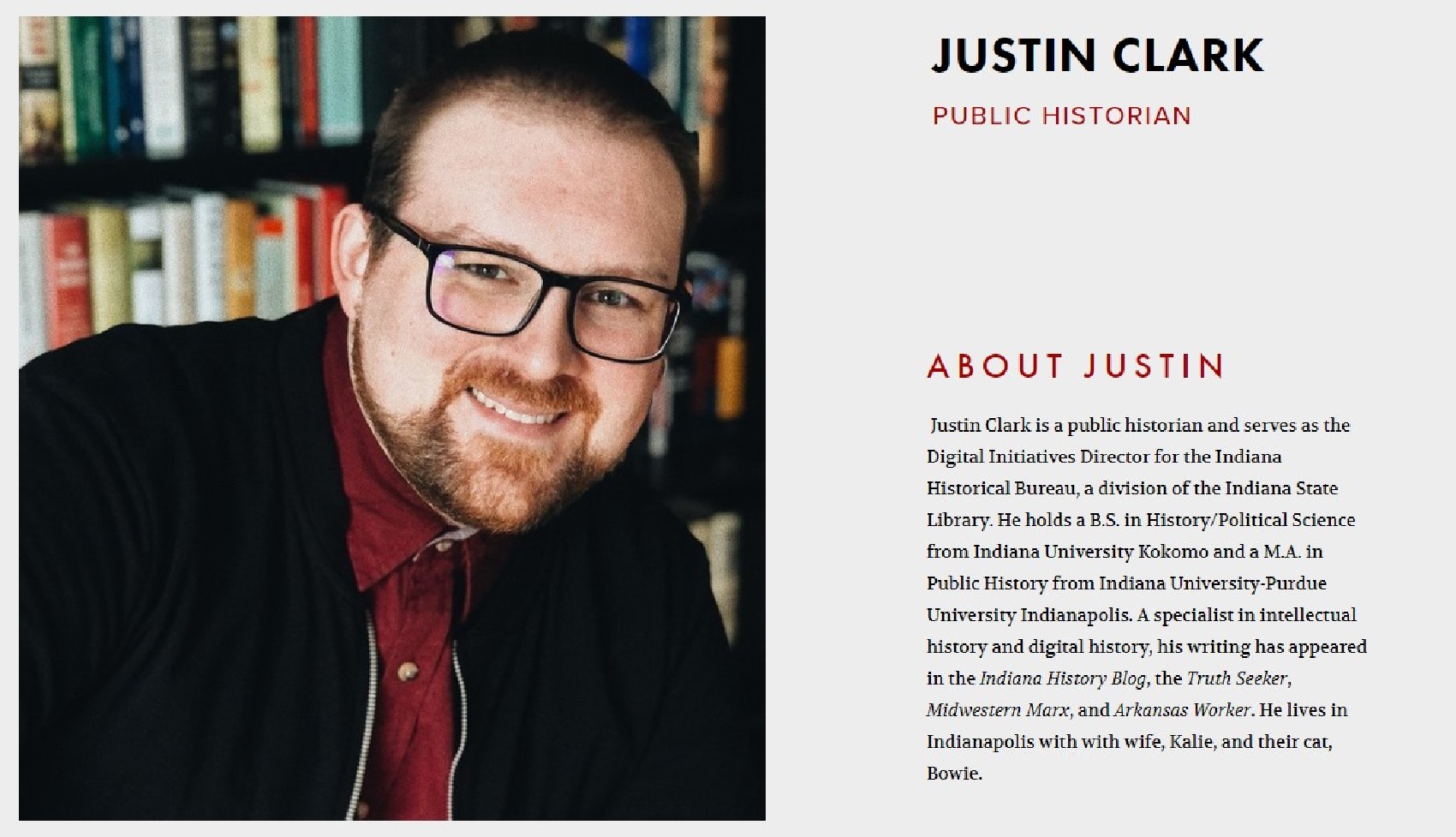
JUSTIN CLARK (HISTORIAN): Atheism, Humanism, Politics, Economics, and Marxism (Video)
JUSTIN CLARK
Website (justinclark.org)
Blog (justinclark.org/blog)
ABOUT JUSTIN
“Justin Clark is a public historian and serves as the Digital Initiatives Director for the Indiana Historical Bureau, a division of the Indiana State Library. Justin Clark holds a B.S. in History/Political Science from Indiana University Kokomo and a M.A. in Public History from Indiana University-Purdue University Indianapolis. A specialist in intellectual history and digital history, Justin Clark’s writing has appeared in the Indiana History Blog, the Truth Seeker, Midwestern Marx, and Arkansas Worker. Justin Clark lives in Indianapolis with wife, Kalie, and their cat, Bowie.” ref
“Justin Clark’s research focused on orator and politician Robert Green Ingersoll (1833-1899). Robert Ingersoll was one of the most popular and influential figures during the “Golden Age of Freethought” in the United States, from the 1870s to the 1910s. Its supporters advocated for skepticism, science, and the separation of church and state. However, Robert Ingersoll’s role as a “public intellectual” has been challenged by scholars of the period, who argue that Robert Ingersoll was merely a popularizer of ideas. Justin Clark’s conclusion does not adequately describe Ingersoll’s role within the period. Rather, Ingersoll was a synthesizer of ideas, making complex concepts of philosophy, theology, science, and history into palatable lectures and books for an eager and understanding public. As a complementary counterpoint to Robert Ingersoll’s role as synthesizer, Robert Ingersoll also spurred a multiplicity of responses from believers and nonbelievers alike who imbibed Robert Ingersoll’s ideas. As such, Robert Ingersoll’s role in the central Midwest, Illinois, and Indiana in particular, supports Robert Ingersoll’s place as a public intellectual. From Robert Ingersoll’s public discourses with the evangelist Dwight Moody and other believers, his influence on the Freethinker Society of Indianapolis, to his answers to Indianapolis clergy, Robert Ingersoll’s experiences in the Midwest solidified Robert Ingersoll’s place within American history as a compelling and thoughtful public intellectual. You can read it here.” ref
Justin Clark is an atheist which he states under the title of Secular Humanist because he wants to express what he values not what he doesn’t. And he holds the political thinking of Marxism–Leninism.
Atheism
A-theism means not-theism, just as A-religious means non-religious. “Non-theism” such as the atheism that is often inherent in terms like Secular humanism. Thus, “Non-theism” is an atheism position stated in a believed less offensive way to or for theists who the communication believes fear or dislike atheism. A “not” Theism is the meaning of atheism.
“Atheism, in the broadest sense, is an absence of belief in the existence of deities. Implicit atheism and explicit atheism are types of atheism. “Implicit atheism” is defined as “the absence of theistic belief without a conscious rejection of it”, while “explicit atheism” is “the absence of theistic belief due to a conscious rejection of it.” ref, ref
For more info read:
“Atheism and Agnosticism” Stanford Encyclopedia of Philosophy
“Atheism” Internet Encyclopedia of Philosophy
Secular Humanism
“Secular humanism, often simply called humanism, is a philosophy, belief system, or life stance that embraces human reason, secular ethics, and philosophical naturalism while specifically rejecting religious dogma, supernaturalism, and superstition as the basis of morality and decision making. Secular humanism posits that human beings are capable of being ethical and moral without religion or belief in a deity. It does not, however, assume that humans are either inherently good or evil, nor does it present humans as being superior to nature. Rather, the humanist life stance emphasizes the unique responsibility facing humanity and the ethical consequences of human decisions.” ref
“Fundamental to the concept of secular humanism is the strongly held viewpoint that ideology—be it religious or political—must be thoroughly examined by each individual and not simply accepted or rejected on faith. Along with this, an essential part of secular humanism is a continually adapting search for truth, primarily through science and philosophy. Many secular humanists derive their moral codes from a philosophy of utilitarianism, ethical naturalism, or evolutionary ethics, and some advocate a science of morality.” ref
For more info read:
secularhumanism.org › “What is Secular Humanism?” | Free Inquiry
centerforinquiry.org › “What is Secular Humanism” – CFI – Center for Inquiry
Marxism–Leninism
“Marxism–Leninism is a communist ideology which was the main communist movement throughout the 20th century. It was the formal name of the state ideology adopted by the Soviet Union, its satellite states in the Eastern Bloc, and various scientific socialist countries in the Non-Aligned Movement and Third World during the Cold War as well as the Communist International after Bolshevisation. Today, Marxism–Leninism is the ideology of several communist parties, despite the de-Leninization that occurred after the dissolution of the USSR, and remains the official ideology of the ruling parties of China, Cuba, Laos, and Vietnam as one-party socialist republics, and of Nepal in a multiparty democracy.” ref
“Marxism–Leninism holds that a two-stage communist revolution is needed to replace capitalism. A vanguard party, organized through democratic centralism, would seize power on behalf of the proletariat and establish a one-party socialist state, called the dictatorship of the proletariat. The state would control the means of production, suppress opposition, counter-revolution and the bourgeoisie, and promote Soviet collectivism, to pave the way for an eventual communist society that would be classless and stateless. Generally, Marxist-Leninists oppose anarchism, fascism, imperialism, and liberal democracy. Marxist–Leninist states have been commonly referred to by Western academics as Communist states.” ref
“Marxism–Leninism was developed by Joseph Stalin in the 1920s based on his understanding and synthesis of orthodox Marxism and Leninism. After the death of Vladimir Lenin in 1924, Marxism–Leninism became a distinct movement in the Soviet Union when Stalin and his supporters gained control of the party. It rejected the common notion among Western Marxists of world revolution as a prerequisite for building socialism, in favour of the concept of socialism in one country. According to its supporters, the gradual transition from capitalism to socialism was signified by the introduction of the first five-year plan and the 1936 Soviet Constitution.” ref
“By the late 1920s, Stalin established ideological orthodoxy in the Russian Communist Party (Bolsheviks), the Soviet Union, and the Communist International to establish universal Marxist–Leninist praxis. The formulation of the Soviet version of dialectical and historical materialism in the 1930s by Stalin and his associates, such as in Stalin’s book Dialectical and Historical Materialism, became the official Soviet interpretation of Marxism,[20] and was taken as an example by Marxist-Leninists in other countries. In 1938, Stalin’s official textbook History of the Communist Party of the Soviet Union (Bolsheviks) popularised the term “Marxism-Leninism.” ref
“The internationalism of Marxism–Leninism was expressed in supporting revolutions in other countries, initially through the Communist International and then through the concept of socialist-leaning countries after de-Stalinisation. The establishment of other Communist states after World War II resulted in Sovietisation, and these states tended to follow the Soviet Marxist–Leninist model of five-year plans and rapid industrialization, political centralization, and repression. During the Cold War, Marxism–Leninism was a driving force in international relations. With the death of Stalin and de-Stalinisation, Marxism–Leninism underwent several revisions and adaptations such as Guevarism, Ho Chi Minh Thought, Hoxhaism, Maoism, socialism with Chinese characteristics, and Titoism.” ref
“This also caused several splits between Marxist–Leninist states, resulting in the Tito–Stalin split, the Sino-Soviet split, and the Sino-Albanian split. The socio-economic nature of Marxist–Leninist states, especially that of the Soviet Union during the Stalin era, has been much debated, varyingly being labeled a form of bureaucratic collectivism, state capitalism, state socialism, or a totally unique mode of production. The Eastern Bloc, including Marxist–Leninist states in Central and Eastern Europe as well as the Third World socialist regimes, have been variously described as “bureaucratic-authoritarian systems”, and China’s socio-economic structure has been referred to as “nationalistic state capitalism.” ref
“Criticism of Marxism–Leninism largely overlaps with criticism of communist party rule and mainly focuses on the actions and policies of Marxist–Leninist leaders, most notably Stalin, Mao Zedong, and Pol Pot. Marxist–Leninist states have been marked by a high degree of centralized control by the state and communist party, political repression, state atheism, collectivization, and use of forced labor and labor camps, as well as free universal education and healthcare, low unemployment, and lower prices for certain goods. Historians such as Silvio Pons and Robert Service stated that the repression and totalitarianism came from Marxist–Leninist ideology.” ref
“Historians such as Michael Geyer and Sheila Fitzpatrick have offered other explanations and criticize the focus on the upper levels of society and use of concepts such as totalitarianism which have obscured the reality of the system. While the emergence of the Soviet Union as the world’s first nominally Communist state led to communism’s widespread association with Marxism–Leninism and the Soviet model, several academics say that Marxism–Leninism in practice was a form of state capitalism, or a non-planned administrative-command system or command economy.” ref
For more info read:
Marxist IQ: Lenin and Marxism-Leninism BY:COMMUNIST PARTY USA
Here are a few from Justin Clark’s blog:
“STEADFAST EVEN IN PERSECUTION”: VOLTAIRINE DE CLEYRE AND THE LEGACY OF THOMAS PAINE
“American anarchist Voltairine de Cleyre carried the torch of freethought and radicalism exemplified by revolutionary pamphleteer Thomas Paine, an iconoclasm infused with deep moral righteousness and an unrepentant sense of individualism. She defined her struggle for a stateless society in many of the same terms that Paine defined the fight for American independence, emphasizing political liberty, individual rights, equality, and mutual cooperation. She also stressed the importance of his character in her work. de Cleyre wrote of Paine that “he stood firm, proclaiming what he believed, not counting the cost. We may not believe as he; most of us do not. But that is the man we love: who has something in him superior to the judgments of men; who holds steadfast—steadfast even in persecution, even to death.” Likewise, we may not always agree with the convictions of Voltairine de Cleyre, but her own steadfastness echoed the legacy of America’s most underappreciated, and perennially misunderstood, founding father.” Read More
THE CULTURE OF SURVIVAL: CHRISTOPHER LASCH’S “MINIMAL SELF”
“Christopher Lasch’s The Minimal Self is an important, if overlooked, work in the canon of his thought; it articulated more directly his concerns and offered a clearer alternative than his more celebrated work. His crusade to stem the tide of narcissism and politics as cultural affect is something to be celebrated, for he anticipated so much of what came to pass. Our age is also one of crisis and survival, and if we seek to get beyond its confines, Lasch’s ideas represent part of the blueprint to change our collective future.” Read More
SOCIETY AND SOLITUDE IN THE AGE OF COVID
“We are living through history, and those of us who survive this crisis will talk about it for decades. It is one of the defining characteristics of our era. With so much going wrong in this world, it is easy to get cynical, to throw up your hands and give up. But that’s not the lesson I wanted to impart today. Each of us has been shaped by this crisis, and the test of our will is in finding out how we respond to it. As such, Emerson’s insights provide us with one voice in a chorus of wisdom that will guide us forward.” Read More
DANIEL DENNETT’S “BREAKING THE SPELL”: 15 YEARS ON
“Fifteen years later, do the criticisms of Daniel Dennett’s Breaking the Spell hold up? Are Dennett’s concepts of religion off base, or has new scholarship vindicated him? In this re-review of sorts, I will address the main critiques discussed above and evaluate whether they, or the book itself, stand the test of time. We’ll review whether Dennett’s call to “break the spell” is so revolutionary, if religions are “memes,” if people believe in religion because they believe that belief is itself a virtue, what Dennett calls “belief in belief,” and what we should do with religion in the modern age. In the final estimation, we’ll find that each of these conclusions is deeply flawed and the reviewers were right to call out Dennett for his mistakes. In closing, I’ll also challenge the oft-heard notion that Dennett is the “nice” one of the group. While he’s certainly the more level-headed of the bunch when comparing his book to say, The God Delusion or The End of Faith, Dennett still displays all the usual hallmarks of mainstream atheism in our culture: smugness, arrogance, condescension, and intolerance. In short, Breaking the Spell isn’t a bad book, but it isn’t much of a good book, either.” Read More
“MILITANT MATERIALISM”: V. I. LENIN, SOCIALISM, AND RELIGION
“In his writings, Lenin defended traditional secularist values, such as the separation of church and state, liberty of conscience, and free religious association, while also calling for the political separation of religion from political parties and strategically advocating for the atheist/materialist worldview. While it would be too much to say that Lenin was a “humanist” in the general sense of the term, he was nevertheless a secularist whose insights on religion provide left humanists with clear, tactical advice on the interrelationship between faith and politics in the public sphere.” Read More
MICHAEL BROOKS: AGAINST THE WEB
“Against the Web: A Cosmopolitan Answer to the New Right (2020, zer0 Books) gives us Michael Brooks’ uncompromising, hilarious, and brilliant analysis of the Intellectual Dark Web from a left perspective. He lays out for the reader all the problematic, insidious, and frightening aspects of the IDW and how we as leftists and socialists should respond to them. He ends the book with an optimistic message of humanism, universalism, and cosmopolitanism invigorated with class-conscious politics and a willingness to call to task the regressive tendencies of this new, but in some sense very old, configuration of the right.” Read More
“THE ETERNAL YEA TO LIFE”: THE RADICAL HUMANISM OF EMMA GOLDMAN
“During her many years of activism, anarchist intellectual Emma Goldman wrote for a variety of publications, including Mother Earth, a magazine she founded in 1906. Her writing championed free speech and expression, free love and open relationships, anarchism, the rights of labor, education, birth control, and criticisms of religion. This essay will explore Goldman’s ideas about atheism and how they fit into her larger ideological framework. As her writings will show, three core themes permeate Goldman’s work: strong advocacy for individual freedom, rejection of Christianity, and the defense of atheism. In all, Emma Goldman’s radical atheism was rooted in her love of humanity, and while the term didn’t exist then, that made her a deeply committed humanist.” Read More
THE FREE WILL DEBATE: MARTIN GARDNER AND THE MYSTERIANS
“In considering the philosophical problem of free will, one particular viewpoint keeps tapping the back of my mind, like a reliable friend who is there to remind you of your lapses. What if we’re approaching the free will discussion incorrectly altogether? What if the problem of free will can’t be solved, or at least not yet? What if we don’t have the requisite knowledge to definitively answer the free will problem?” Read More
THE ANTI-ELITIST INTELLECTUALISM OF ISAAC ASIMOV
“The prolific science fiction author Isaac Asimov, best known for books such as I, Robot and the Foundation series, devoted his life to the causes of science, knowledge, and education. He valued the importance of intellect for a healthy democracy, lamenting the United States’ tendency towards anti-intellectualism. Yet, he also criticized the arrogance, foolishness, and elitism of some of the most intellectually-gifted in our society, particularly in his involvement with Mensa, the social organization of high-IQ individuals. His experiences with the group, good and especially bad, fostered his growing distaste for IQ tests, intellectual gamesmanship, and reactionary politics. In this essay, we’ll be exploring these themes and how their interaction cultivated Asimov’s unique position of anti-elitist intellectualism.” Read More
ANXIETY, KIERKEGAARD, AND ME: LIVING AND THRIVING WITH NERVOUSNESS
“Anxiety is a concept that is nearly universally experienced but almost universally misunderstood. It is not plain nervousness, like when you stop abruptly at a stop light or surprisingly run into an ex-partner or an in-law. For me and many others, it is a constant, pervasive dread that permeates our very existence. A couple of years ago I realized that my anxiety was beginning to affect nearly every aspect of my life, from work and relationships to even my ability to sleep at night. It was here that I began my own investigations into anxiety, reading and studying as much as I could on the subject. From learning about Buddhism to Psychoanalysis and everything in between, I really didn’t crack the “anxiety code” until I discovered a nineteenth-century philosopher who wrote a pioneering book on the subject in 1844.” Read More
THE EXUBERANT SKEPTICISM OF PAUL KURTZ
“Paul Kurtz’s skepticism is so much more than debunking the supernatural or fact-checking dubious claims. It is a powerful tool used in the service of improving ourselves, the lives of others, our societies, and our planet. It is rooted in the Enlightenment tradition of Immanuel Kant, who encouraged us to “sapere aude,” or “dare to know.” We often focus on the “know” part of that phrase, as cliches abound on the importance of knowledge (“knowledge is power,” “knowledge is half the battle,” etc.). Yet, Kurtz’s skepticism also homes in on the value of daring, how seeking knowledge can not only give us the correct answer but can give us a better life. We should dare to know—with all of the successes and failures we’ll find along the way—because that’s what makes life worth living.” Read More
THE INJUNCTION OF HAPPINESS: SLAVOJ ŽIŽEK AND CAPITALIST BUDDHISM
“Buddhism in the western, capitalist context is the same kind of hollow experience that the fleshlight is for sex; it makes one feel better in the short term but doesn’t actually remedy one’s issues in the long term. In this variant, Buddhism is no more a challenger of our material conditions then right-wing Christianity. As Žižek writes, “Although Buddhism presents itself as the remedy for the stressful tension of capitalist dynamics, allowing us to uncouple and retain inner peace and Gelassenheit (self-surrender), it actually functions as capitalism’s perfect ideological supplement.” Read More
DAN BARKER’S “HARMONIC FREE WILL”
“For many, like the renowned skeptic Martin Gardner, the problem of free will is much like the problem of consciousness, something currently unsolvable based on our lack of knowledge or an insufficient framing of the question. However, what if we’re approaching this the wrong way altogether? What if we’re making this problem harder than we have to? This is author Dan Barker’s take on the problem, in his new book, Free Will Explained. Barker, a former fundamentalist minister turned atheist, uses his breezy tone and biting wit to address one of philosophy’s most daunting problems, one he thinks we’ve grown from a molehill into a mountain.” Read More
ESSENTIALISM AND HUMANISM: DECLUTTERING YOUR LIFE AND FINDING YOUR PURPOSE
“I’ve learned about a philosophy of life that has completely reshaped my thinking about what it means to live well. It’s a lifestyle focused less on the amount of things, tasks, and relationships we accrue and more on the quality and intentionality of things, tasks, and relationships we bring into our lives. In short, it’s about finding what is essential for you to be the best version of yourself that you can be.” Read More
JUSTIN CLARK (justinclark.org/podcast) of Red Reviews with Cory Johnston
Red Reviews are a production of The Mind of a Skeptical Leftist (YouTube)
Red Reviews #1 – The Ministry for the Future
Red Reviews #2 – Breaking the Spell
Red Reviews #3 Inventing Reality
Red Reviews #4 The Question of Palestine
Red Reviews #5 The Deficit Myth
Red Reviews #6 Socialism Utopian and Scientific
Red Reviews #7 The Narrative of the Life of Frederick Douglass
Red Reviews #8 – Democracy at Work
Red Reviews #10 – Black Shirts and Reds
Red Reviews #11 The Origin of Capitalism
Red Reviews #12 A Brief History of Neoliberalism
Red Reviews #13 – The Communist Manifesto
Red Reviews #14 The State and Revolution
Red Reviews #15 – Two Books on the Russian Revolution
Red Reviews #17 – The Minimal Self
Red Reviews #18 – On Practice and Contradiction
Red Reviews #19 – Existentialism is a Humanism
Red Reviews #20 – Women, Race, and Class
Red Reviews #21 – Revolutionary Education with guest Nino Brown
Red Reviews #22 Two Books On Climate Change
Red Reviews #23 – Mutual Aid: A Factor of Evolution
Contact Justin Clark (justinclark.org/contact)
SPEAKING EVENTS
“Over the last few years, Justin Clark has given many talks on history and secular humanism for organizations and universities across the country and in Europe. Of these include the National Council of Public History, Midwestern History Association, Indiana Association of Historians, Society of German American Studies, Carmel Clay Public Library, Heartland Unitarian Universalist Church, Center for Inquiry, New School for Social Research, and the University of Münster. If you’re interested in having Justin Clark come to speak to your organization, please email Justin Clark at justinclarkpubhist@gmail.com.” ref
Plato’s Cave Ep. 7 – (ft.) Public Historian Justin Clark
“In this episode, Jordan Myers speaks with Public Historian Justin Clark about the current social and economic situation surrounding COVID and about the underlying philosophy and logic of different political ideologies in general.”
Justin Clark opening for my Caring Firebrand Atheist Activism event
Justin Clark opening for my Caring Firebrand Atheist Activism event in Indianapolis, In.
Caring Firebrand Atheist Activism Indianapolis, Indiana: Link
Caring firebrand atheism vs. Christian nationalism and dominionism: Link
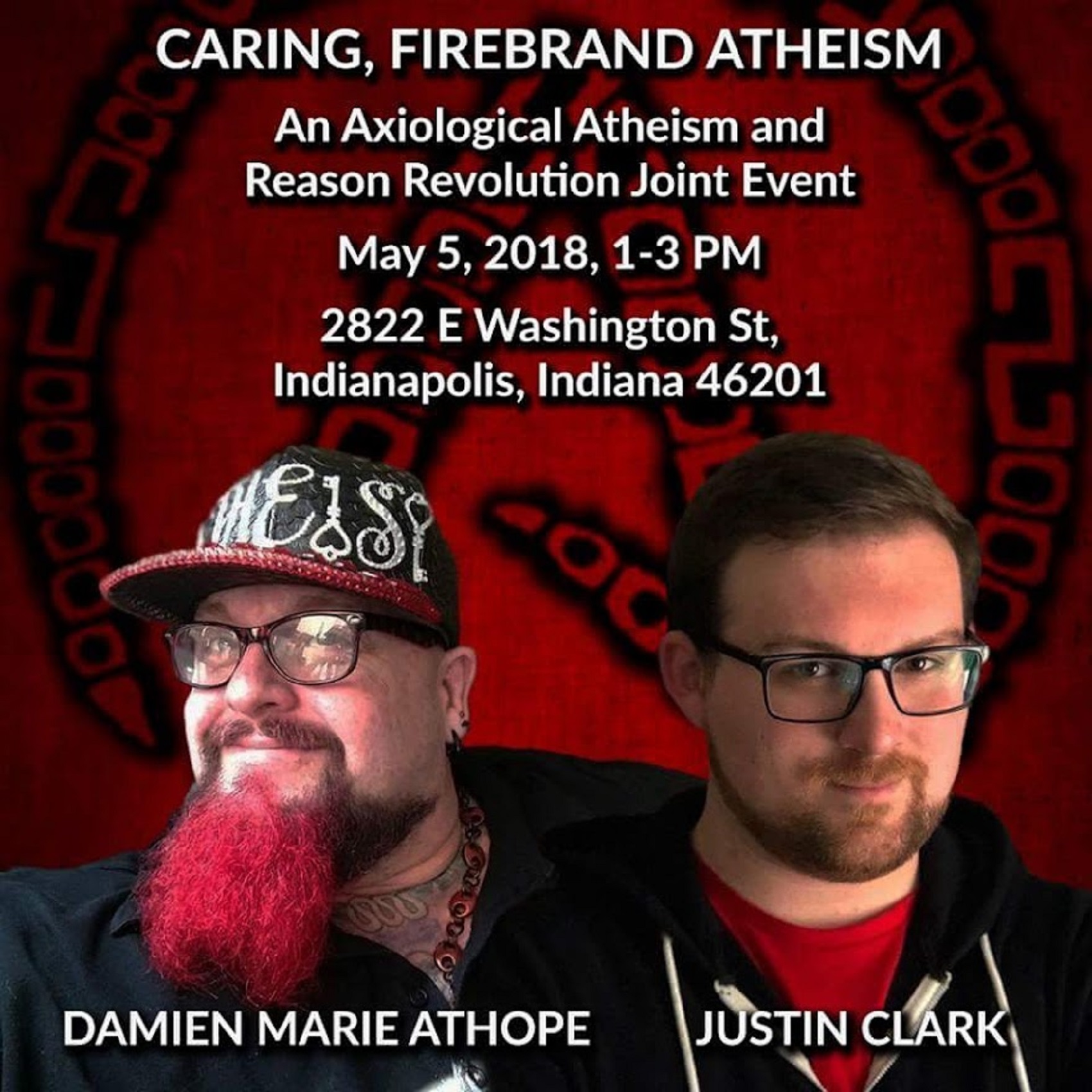

Communism
“Communism (from Latin communis, ‘common, universal’) is a far-left philosophical, social, political, and economic ideology and movement whose goal is the establishment of a communist society, namely a socioeconomic order based on the idea of common ownership of the means of production, distribution, and exchange, allocating products to everyone in the society. It can involve the absence of social classes, money, and the state. Communism, while sometimes used as a synonym of socialism, is mainly a specific, yet distinct, form of socialism. Communists often seek a voluntary state of self-governance, but disagree on the means to this end. This reflects a distinction between a more libertarian approach of communization, revolutionary spontaneity, and workers’ self-management, and a more vanguardist or communist party-driven approach through the development of a constitutional socialist state followed by Friedrich Engels‘ withering away of the state.” ref
“Variants of communism have been developed throughout history, including anarcho-communism and Marxist schools of thought, among others. Communism includes a variety of schools of thought which broadly include Marxism, Leninism, and libertarian communism as well as the political ideologies grouped around both, all of which share the analysis that the current order of society stems from capitalism, its economic system, and mode of production, namely that in this system there are two major social classes, the relationship between these two classes is exploitative, and that this situation can only ultimately be resolved through a social revolution. The two classes are the proletariat (the working class), who make up the majority of the population within society and must work to survive, and the bourgeoisie (the capitalist class), a small minority who derives profit from employing the working class through private ownership of the means of production. According to this analysis, revolution would put the working class in power and in turn, establish common ownership of property which is the primary element in the transformation of society towards a communist mode of production.” ref
“In the 20th century, ostensibly Communist governments espousing Marxism–Leninism and its variants came into power in parts of the world, first in the Soviet Union with the Russian Revolution of 1917, and then in portions of Eastern Europe, Asia, and a few other regions after World War II. During most of the 20th century, around one-third of the world’s population lived under communist governments. These governments were characterized by one-party rule and suppression of opposition and dissent. Along with social democracy, communism became the dominant political tendency within the international socialist movement by the 1920s. Several academics and economists, among other scholars, posit that the Soviet model under which these nominally Communist states in practice operated was not an actual communist economic model in accordance with most accepted definitions of communism as an economic theory, but in fact a form of state capitalism, or non-planned administrative-command system.” ref
Types of Socialism
“Types of socialism include a range of economic and social systems characterized by social ownership and democratic control of the means of production and organizational self-management of enterprises as well as the political theories and movements associated with socialism. Social ownership may refer to forms of public, collective, or cooperative ownership, or to citizen ownership of equity in which surplus value goes to the working class and hence society as a whole. There are many varieties of socialism and no single definition encapsulates all of them, but social ownership is the common element shared by its various forms. Socialists disagree about the degree to which social control or regulation of the economy is necessary, how far society should intervene, and whether government, particularly existing government, is the correct vehicle for change.” ref
“As a term, socialism represents a broad range of theoretical and historical socio-economic systems and has also been used by many political movements throughout history to describe themselves and their goals, generating a variety of socialism types. Socialist economic systems can be further divided into market and non-market forms. The first type of socialism utilizes markets for allocating inputs and capital goods among economic units. In the second type of socialism, planning is utilized and includes a system of accounting based on calculation-in-kind to value resources and goods wherein production is carried out directly for use.” ref
“There have been numerous political movements such as anarchism, communism, the labor movement, Marxism, social democracy, and syndicalism, whose members called themselves socialists under some definition of the term—some of these interpretations are mutually exclusive and all of them have generated debates over the true meaning of socialism. Different self-described socialists have used socialism to refer to different things such as an economic system, a type of society, a philosophical outlook, an ethical socialism in the form of a collection of moral values and ideals, or a certain kind of human character. Some of those definitions of socialism are very vague while others are so specific that they only include a small minority of the things that have been described as socialism in the past such as a mode of production, state socialism, or the abolition of wage labor.” ref
- Socialist planned economy
- State-directed economy
Decentralized planned economy - Market socialism
- Socialist market economy
- Socialist ideologies
- Utopian socialism
- Communism
- Marxism
- Leninism and Marxism–Leninism
- Stalinism
- Maoism
- Dengism
- Trotskyism
- Council communism and left communism
- Autonomism
- Anarchism
- Mutualism
- Collectivist anarchism
- Anarcho-communism
- Anarcho-syndicalism
- Individualist anarchism
- Democratic socialism
- Social democracy
- Eco-socialism
- Green anarchism
- Liberal socialism
- Ethical socialism
- Libertarian socialism
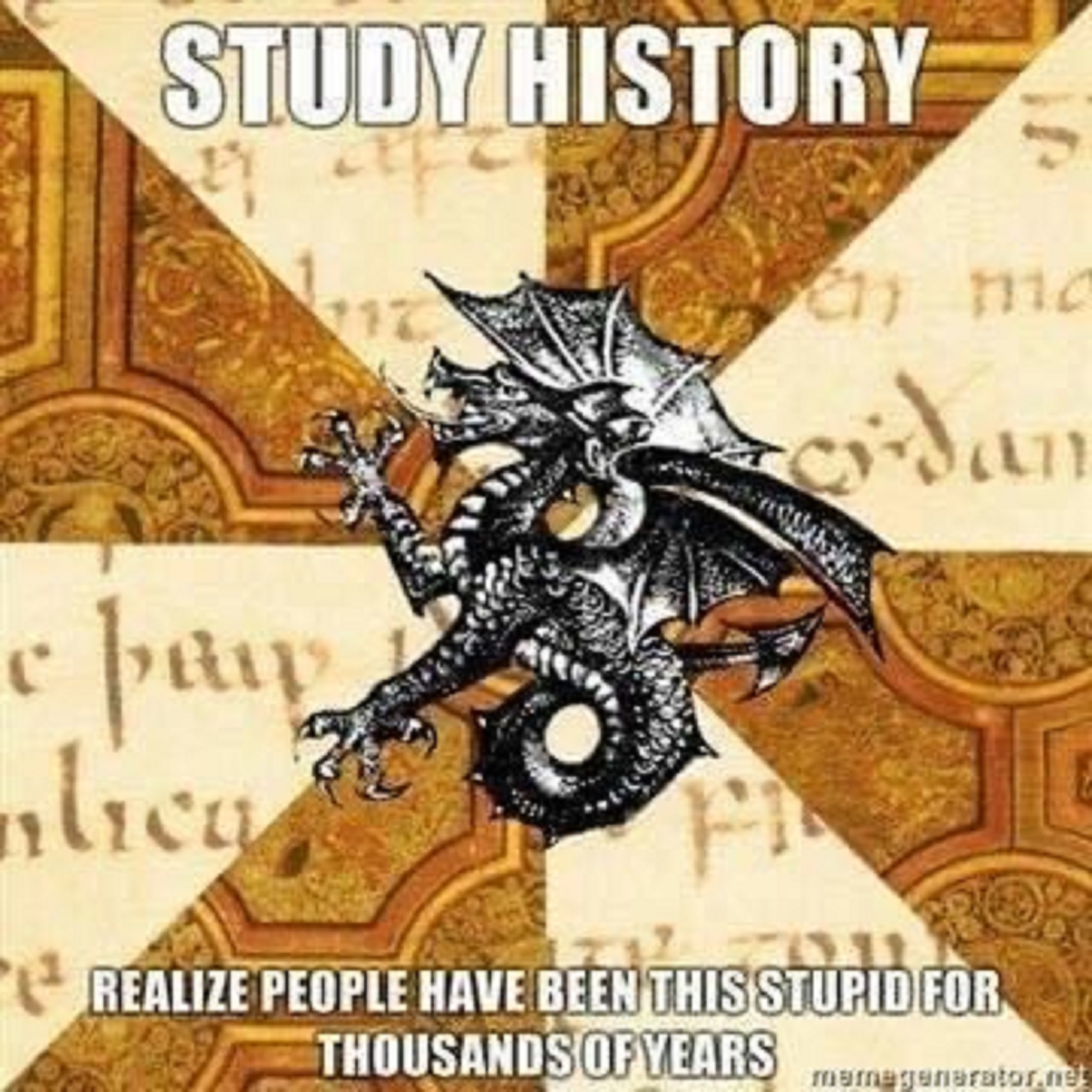
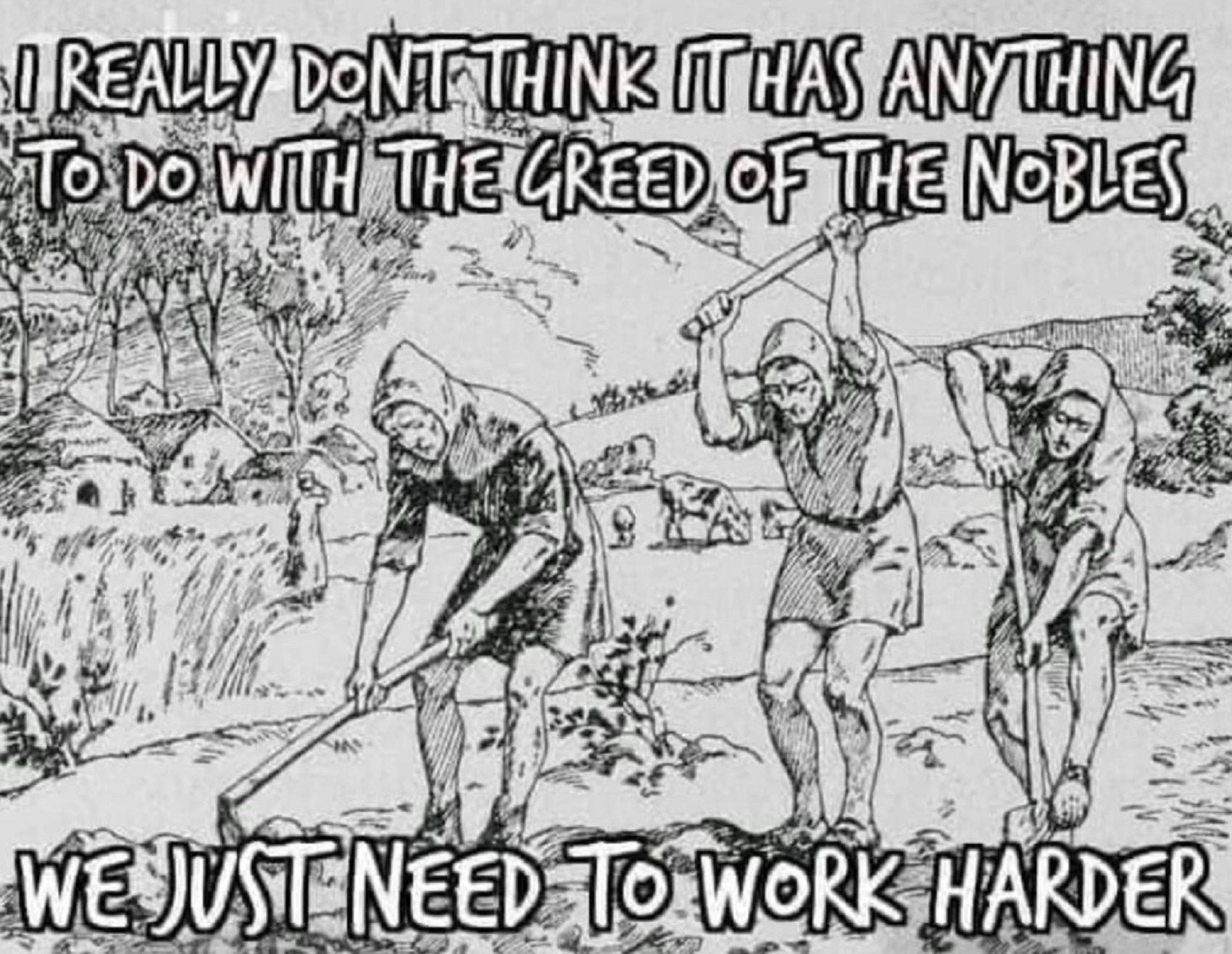
My Caring Firebrand Atheist Activism Training, as Easy as 1 2 3
Damien Marie AtHope Chats With Matt Dillahunty on Atheism and Philosophy (Video)
Aron Ra interviewing me on my “Archaeological/Anthropological Understanding of Religion Evolution” (Video)
Why are lies more appealing than the truth?
American Propaganda and the Myths of Freedom, Equality, Democracy, and Liberty!
SCOTUS and Roe v Wade: “Christian Nationalism”, “Blue Laws”, and “Christofascism”
Capitalism is an unethical economic system based on profit over people.
Elite Power Accumulation: Ancient Trade, Tokens, Writing, Wealth, Merchants, and Priest-Kings
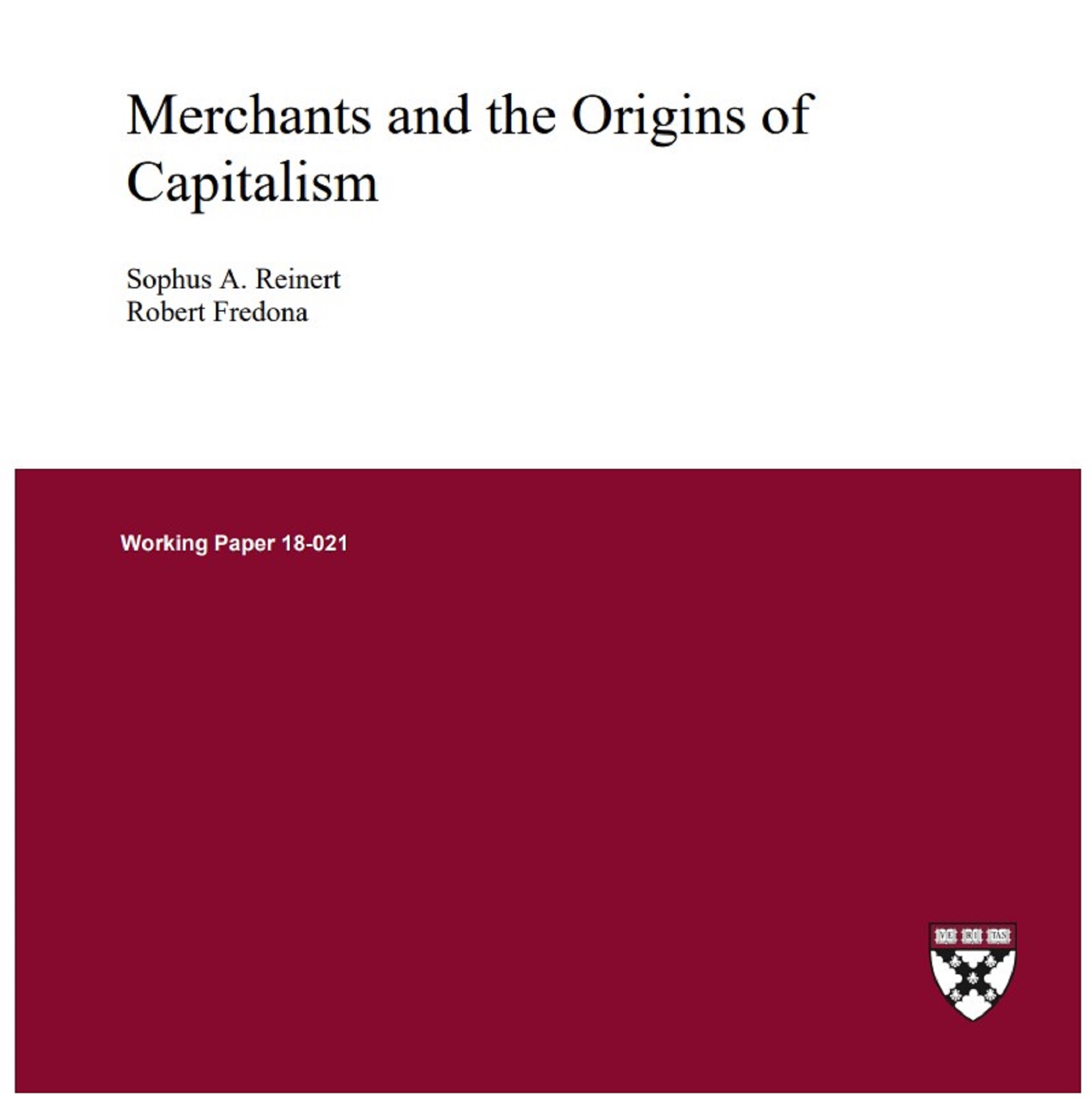
“ABSTRACT: N.S.B. Gras, the father of Business History in the United States, argued that the era of mercantile capitalism was defined by the figure of the “sedentary merchant,” who managed his business from home, using correspondence and intermediaries, in contrast to the earlier “traveling merchant,” who accompanied his own goods to trade fairs. Taking this concept as its point of departure, this essay focuses on the predominantly Italian merchants who controlled the long‐distance East‐West trade of the Mediterranean during the Middle Ages and Renaissance. Until the opening of the Atlantic trade, the Mediterranean was Europe’s most important commercial zone and its trade enriched European civilization and its merchants developed the most important premodern mercantile innovations, from maritime insurance contracts and partnership agreements to the bill of exchange and double‐entry bookkeeping. Emerging from literate and numerate cultures, these merchants left behind an abundance of records that allows us to understand how their companies, especially the largest of them, were organized and managed. These techniques can also be put in the context of premodern attitudes toward commerce and the era’s commercial‐political relations. The Commercial Revolution anticipated the Industrial Revolution by over half a millennium and laid the groundwork for today’s world of global business.” Ref
“CONCLUSION It has lately become fashionable to suggest that the West’s clear economic advantage over the East is a relatively recent phenomenon, with Europe overtaking China only in the mid‐ eighteenth century (Pomeranz 2000), even though earlier periods, like the fourteenth century, 26 have been more persuasively presented on the basis of economic data (Maddison 2006). But the most commercially advanced regions of Europe, like the urban centers of Flanders and North‐Central Italy, were extreme outliers much earlier, both globally and within Europe itself. Italy’s was the leading world economy ca. 1300 and, even with a steady and long decline from then to the 1880s (Malanima 2011), England’s did not overtake it (in terms of real wages) until the eighteenth century (Malanima 2013). Although the Industrial Revolution allowed for unprecedented prosperity and brought about modern economic growth (Hartwell 1971), Michael Mitterauer (2010) is right that Europe was set on its “special path (Sonderweg)” in the Middle Ages, but his search for causes—from the cultivation of rye to the centralization of the Papal church—largely overlooks the patent cause of Europe’s distinct late medieval prosperity, which spurred revolutionary advancements in shipping, communications, and manufacturing: the long‐distance trade of merchants. Indeed, to speak of the makers of global business must be, first of all, to speak of merchants. In this chapter, with its focus on the Mediterranean trade of the Middle Ages and Renaissance, we have shown how the merchant—Gras’s “sedentary merchant”, freed from the harsh demands of travel by his mastery of information and by the seismic innovations of the medieval “commercial revolution”—emerged as a truly global figure. Then, as now, merchants pooled capital and shared risk to enrich themselves and their polities, utilizing the infrastructure and markets that they helped to make, and creating new legal and financial instruments to facilitate their ventures. Premodern merchants bequeathed to the businessmen of later centuries essential techniques of trade and bookkeeping, but also their commercial ethos, their institutions, and the very riches for which they competed and often risked their 27 lives. It is not by chance that the politico‐economic system that followed is called the mercantile system, as in Adam Smith’s (1976: 396‐417) pejorative usage, or simply mercantilism, for, broadly understood, it held that the competition for trade lay at the essential core of state power (Reinert 2013). The violent Genoese‐Venetian struggle for the Mediterranean trade, the aggressive emulation of Italian banking practices in the Low Countries, and so on, are forerunners of the mercantilist age and, indeed, of the perpetual competition, diversity of forms (political and economic), and innovation that has marked the development of the West. Let us conclude with an example, from the Low Countries instead of Italy, which encapsulates much of what had already been said: Bruges, the quintessential merchants’ city, spatially positioned to benefit from the decline of the Champagne fairs and from regional advances in textile manufacturing, was by 1350 a center a trade, finance, and industry: politically responsive to mercantile interests, densely urbanized, concentrating and exploiting the resources of the surrounding countryside, attracting skilled craftsmen as immigrants, hosting large merchant colonies (of Italians and German Hanse traders, of course, but of many others as well), and importing and exporting commodities and luxury goods in a trade covering the known world and extending beyond it, the Flemish seaport was also a center for deposit banking and credit creation, and a clearing house for commercial information (De Roover 1948; van Houtte 1982). To see one of the European merchant metropolises of the late Middle Ages or Renaissance—to see a city like Bruges or like Venice—was, we may say with crystalline hindsight, to glimpse the very future of the global business.” Ref
Merchant Capitalism
“Some economic historians use the term merchant capitalism to refer to the earliest phase in the development of capitalism as an economic and social system. However, others argue that mercantilism, which has flourished widely in the world without the emergence of systems like modern capitalism, is not actually capitalist as such. Merchant capitalism is distinguished from more fully developed capitalism by its focus on simply moving goods from a market where they are cheap to a market where they are expensive (rather than influencing the mode of the production of those goods), the lack of industrialization, and of commercial finance.” ref
“Merchant houses were backed by relatively small private financiers acting as intermediaries between simple commodity producers and by exchanging debt with each other. Thus, merchant capitalism preceded the capitalist mode of production as a form of capital accumulation. A process of primitive accumulation of capital, upon which commercial finance operations could be based and making application of mass wage labor and industrialization possible, was the necessary precondition for the transformation of merchant capitalism into industrial capitalism.” ref
“Early forms of merchant capitalism developed in the 9th century, during the Islamic Golden Age, while in medieval Europe from the 12th century. In Europe, merchant capitalism became a significant economic force in the 16th century. The mercantile era drew to a close around 1800, giving way to industrial capitalism. However, merchant capitalism remained entrenched in some parts of the West well into the 19th century, notably the Southern United States, where the plantation system constrained the development of industrial capitalism (limiting markets for consumer goods) whose political manifestations prevented Northern legislators from passing broad economic packages (e.g. monetary and banking reform, a transcontinental railroad, and incentives for settlement of the American west) to integrate the states’ economies and spur the growth of industrial capitalism.” ref
People need to realize that the end of capitalism will not be a one-time event, nor will the revolution be a one-time event. Keep doing what is needed, inspire others. Solidarity to save the world!
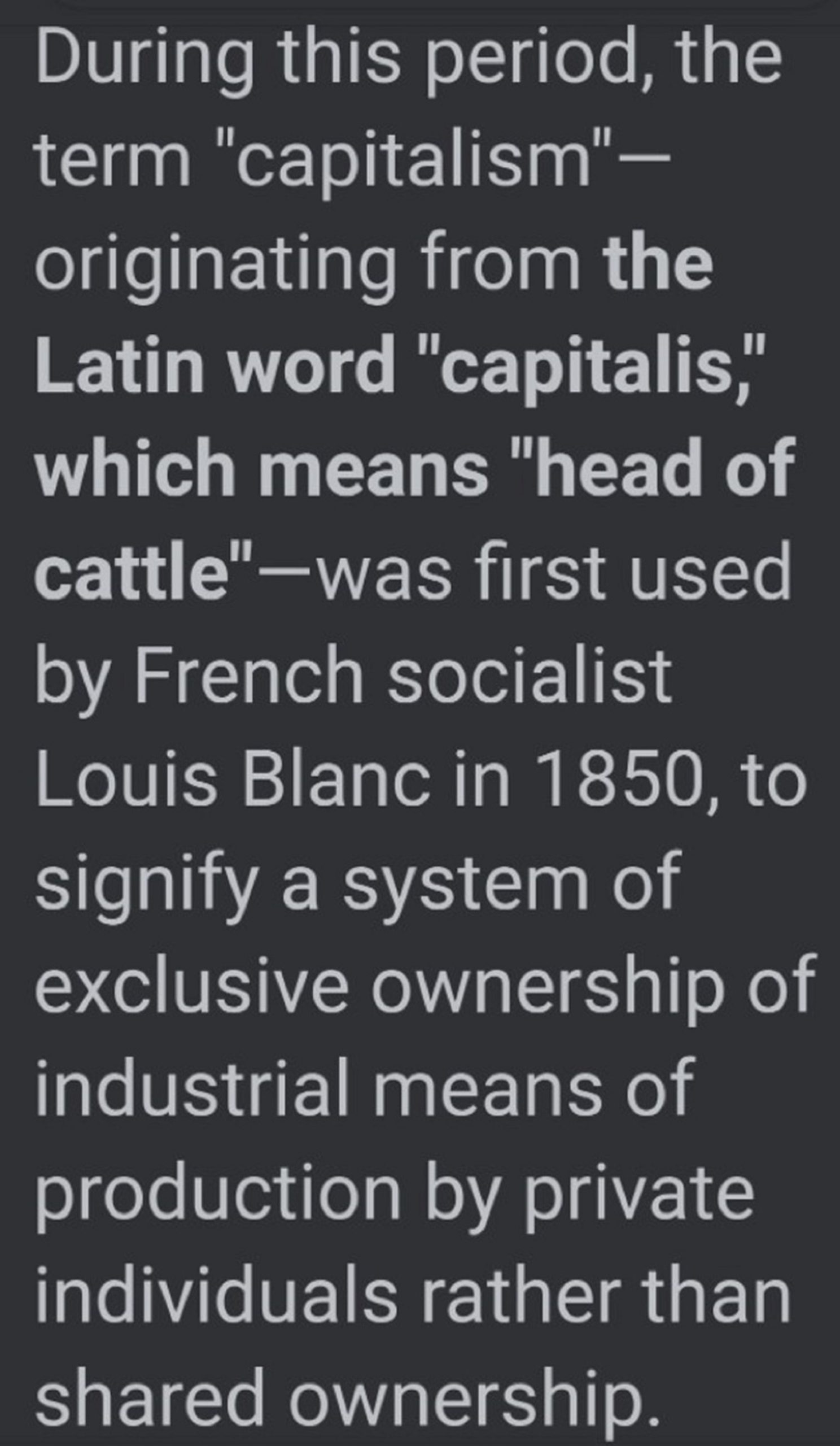
The etymology of the term capitalist and capitalism
“The term “capitalist”, meaning an owner of capital, appears earlier than the term “capitalism” and dates to the mid-17th century. “Capitalism” is derived from capital, which evolved from capitale, a late Latin word based on caput, meaning “head”—which is also the origin of “chattel” and “cattle” in the sense of movable property (only much later to refer only to livestock). Capitale emerged in the 12th to 13th centuries to refer to funds, stock of merchandise, sum of money, or money carrying interest. By 1283, it was used in the sense of the capital assets of a trading firm and was often interchanged with other words—wealth, money, funds, goods, assets, property, and so on.” ref
“The Hollantse (German: holländische) Mercurius uses “capitalists” in 1633 and 1654 to refer to owners of capital. In French, Étienne Clavier referred to capitalistes in 1788, six years before its first recorded English usage by Arthur Young in his work Travels in France (1792). In his Principles of Political Economy and Taxation (1817), David Ricardo referred to “the capitalist” many times. English poet Samuel Taylor Coleridge used “capitalist” in his work Table Talk (1823). Pierre-Joseph Proudhon used the term in his first work, What is Property? (1840), to refer to the owners of capital. Benjamin Disraeli used the term in his 1845 work Sybil.” ref
“The initial use of the term “capitalism” in its modern sense is attributed to Louis Blanc in 1850 (“What I call ‘capitalism’ that is to say the appropriation of capital by some to the exclusion of others”) and Pierre-Joseph Proudhon in 1861 (“Economic and social regime in which capital, the source of income, does not generally belong to those who make it work through their labor”). Karl Marx frequently referred to the “capital” and to the “capitalist mode of production” in Das kapital (1867). Marx did however not use the form capitalism, but instead used capital, capitalist, and capitalist mode of production, which appear frequently.” ref
“In the English language, the term “capitalism” first appears, according to the Oxford English Dictionary (OED), in 1854, in the novel The Newcomes by novelist William Makepeace Thackeray, where the word meant “having ownership of capital”. Also according to the OED, Carl Adolph Douai, a German American socialist and abolitionist, used the term “private capitalism” in 1863.” ref
The etymology of the term capital
capital (adj.)
“In the early 13 century, “of or pertaining to the head,” from Old French capital, from Latin capitalis “of the head,” hence “capital, chief, first,” from caput (genitive capitis) “head” (from PIE root *kaput- “head”). Meaning “main, principal, chief, dominant, first in importance” is from early 15 century in English. The modern informal sense of “excellent, first-rate” is by 1754 (as an exclamation of approval, OED’s first example is 1875), perhaps from earlier use of the word in reference to ships, “first-rate, powerful enough to be in the line of battle,” attested from 1650s, fallen into disuse after 1918. Related: Capitally. A capital letter “upper-case latter,” of larger face and differing more or less in form (late 14 century) is so-called because it stands at the “head” of a sentence or word. Capital gain is recorded from 1921. Capital goods is recorded from 1899. A capital crime or offense (1520s) is one that involves the penalty of death and thus affects the life or “head” (capital had a sense of “deadly, mortal” from late 14c. in English, as it did earlier in Latin). The felt connection between “head” and “life, mortality” also existed in Old English: as in heafodgilt “deadly sin, capital offense,” heafdes þolian “to forfeit life.” Capital punishment was in Blackstone (1765) and classical Latin capitis poena.” ref
capital (n.1)
“In the early 15 century, “a capital letter,” from capital (adj.). The meaning “city or town which is the official seat of government” is first recorded 1660s (the Old English word was heafodstol; Middle English had hevedburgh). For the financial sense see capital (n.2).” ref
capital (n.2)
“In the 1610s, “a person’s wealth,” from Medieval Latin capitale “stock, property,” noun use of neuter of Latin capitalis “capital, chief, first” (see capital (adj.). From 1640s as “the wealth employed in carrying on a particular business,” then, in a broader sense in political economy, “that part of the produce of industry which is available for further production” (1793). [The term capital] made its first appearance in medieval Latin as an adjective capitalis (from caput, head) modifying the word pars, to designate the principal sum of a money loan. The principal part of a loan was contrasted with the “usury”—later called interest—the payment made to the lender in addition to the return of the sum lent. This usage, unknown to classical Latin, had become common by the thirteenth century and possibly had begun as early as 1100 CE, in the first chartered towns of Europe. [Frank A. Fetter, “Reformulation of the Concepts of Capital and Income in Economics and Accounting,” 1937, in “Capital, Interest, & Rent,” 1977] Also see cattle, and compare sense development of fee, and pecuniary. Middle English had chief money “principal fund” (mid-14c.). The noun use of the adjective in classical Latin meant “a capital crime.” ref
capital (n.3)
“Head of a column or pillar,” late 13 century, from Anglo-French capitel, Old French chapitel (Modern French chapiteau), or directly from Latin capitellum “head of a column or pillar,” literally “little head,” diminutive of caput “head” (from PIE root *kaput- “head”).” ref
Entries linking to Capital
“In the mid-13 century, “property” of any kind, including money, land, income; from Anglo-French catel “property” (Old North French catel, Old French chatel), from Medieval Latin capitale “property, stock,” noun use of neuter of Latin adjective capitalis “principal, chief,” literally “of the head,” from caput (genitive capitis) “head” (from PIE root *kaput- “head”). Compare sense development of fee, pecuniary. In later Middle English especially “movable property, livestock” (early 14 century), including horses, sheep, asses, etc.; it began to be limited to “cows and bulls” from the late 16 century.” ref
“Middle English, representing the merger or mutual influence of two words, one from Old English, one from an Old French form of the same Germanic word, and both ultimately from a PIE root meaning “cattle.” The Old English word is feoh “livestock, cattle; movable property; possessions in livestock, goods, or money; riches, treasure, wealth; money as a medium of exchange or payment,” from Proto-Germanic *fehu (source also of Old Saxon fehu, Old High German fihu, German Vieh “cattle,” Gothic faihu “money, fortune”). This is from PIE *peku- “cattle” (source also of Sanskrit pasu, Lithuanian pekus “cattle;” Latin pecu “cattle,” pecunia “money, property”).” ref
“The other word is Anglo-French fee, from Old French fieu, a variant of fief “possession, holding, domain; feudal duties, payment” (see fief), which apparently is a Germanic compound in which the first element is cognate with Old English feoh. Via Anglo-French come the legal senses “estate in land or tenements held on condition of feudal homage; land, property, possession” (c. 1300). Hence fee-simple (late 14 century) “absolute ownership,” as opposed to fee-tail (early 15 century) “entailed ownership,” inheritance limited to some particular class of heirs (the second element from Old French taillir “to cut, to limit”).” ref
The feudal sense was extended from landholdings to inheritable offices of service to a feudal lord (late 14c.; in Anglo-French late 13 century), for example, forester of fe “a forester by heritable right.” As these often were offices of profit, the word came to be used for “remuneration for service in office” (late 14 century), hence, “payment for (any kind of) work or services” (late 14 century). From the late 14 century as “a sum paid for a privilege” (originally admission to a guild); to the early 15 century as “money payment or charge exacted for a license, etc.” ref
The etymology of the term Cattle
“Cattle did not originate as the term for bovine animals. It was borrowed from Anglo-Norman catel, itself from medieval Latin capitale ‘principal sum of money, capital’, itself derived in turn from Latin caput ‘head’. Cattle originally meant movable personal property, especially livestock of any kind, as opposed to real property (the land, which also included wild or small free-roaming animals such as chickens—they were sold as part of the land). The word is a variant of chattel (a unit of personal property) and closely related to capital in the economic sense. The term replaced earlier Old English feoh ‘cattle, property’, which survives today as fee (cf. German: Vieh, Dutch: vee, Gothic: faihu).” ref
“The word cow came via Anglo-Saxon cū (plural cȳ), from Common Indo-European gʷōus (genitive gʷowés) ‘a bovine animal’, cf. Persian: gâv, Sanskrit: go-, Welsh: buwch. The plural cȳ became ki or kie in Middle English, and an additional plural ending was often added, giving kine, kien, but also kies, kuin and others. This is the origin of the now archaic English plural, kine. The Scots language singular is coo or cou, and the plural is kye.” ref
“In older English sources such as the King James Version of the Bible, cattle refers to livestock, as opposed to deer which refers to wildlife. Wild cattle may refer to feral cattle or to undomesticated species of the genus Bos. Today, when used without any other qualifier, the modern meaning of cattle is usually restricted to domesticated bovines.” ref


WORLD CHILD HUNGER FACTS
“Nutritious foods in adequate amounts are essential for everyone but particularly for children. In early childhood, adequate nutrition can ensure healthy growth, proper organ formation and function, a strong immune system, and neurological and cognitive development. Nutrition, too, has increasingly been recognized as a basic pillar for social and economic development. Well-nourished people can learn new skills, think critically, and contribute to their communities. Improving child nutrition impacts global, national, and regional child survival, primary education, women’s empowerment, and maternal and child health rates.” ref
“Child malnutrition hurts cognitive function and contributes to poverty by impeding people’s ability to lead productive lives. Poverty is the leading cause of hunger, but poverty also results from hunger, in a cyclical relationship. In spite of the importance of childhood nutrition and significant progress in the last 25 years, global childhood hunger is still rampant.” ref
- “Overall, 5.6 million children under age five died in 2016, nearly 15,000 daily (World Health Organization [WHO], 2016). The risk of a child dying before five years of age is highest in Africa (76.5 per 1000 live births), about 8 times higher than in Europe (9.6 per 1000 live births) (WHO, 2016).
- Approximately 3.1 million children die from undernutrition each year (UNICEF, 2018a). Hunger and undernutrition contribute to more than half of global child deaths, as undernutrition can make children more vulnerable to illness and exacerbate disease (UNICEF, 2018a).
- Children who are poorly nourished suffer up to 160 days of illness each year (Glicken, M.D., 2010). Undernutrition magnifies the effect of every disease including measles and malaria. The estimated proportions of deaths in which undernutrition is an underlying cause are roughly similar for diarrhea (61%), malaria (57%), pneumonia (52%), and measles (45%) (Black, Morris, & Bryce, 2003; Bryce et al., 2005). Malnutrition can also be caused by diseases, such as the diseases that cause diarrhea, by reducing the body’s ability to convert food into usable nutrients (Black, Morris, & Bryce, 2003; Bryce et al., 2005)
- 66 million primary school-age children attend classes hungry across the developing world, 23 million whom live in Africa, which greatly impacts their ability to learn (World Food Programme [WFP], 2012).” ref
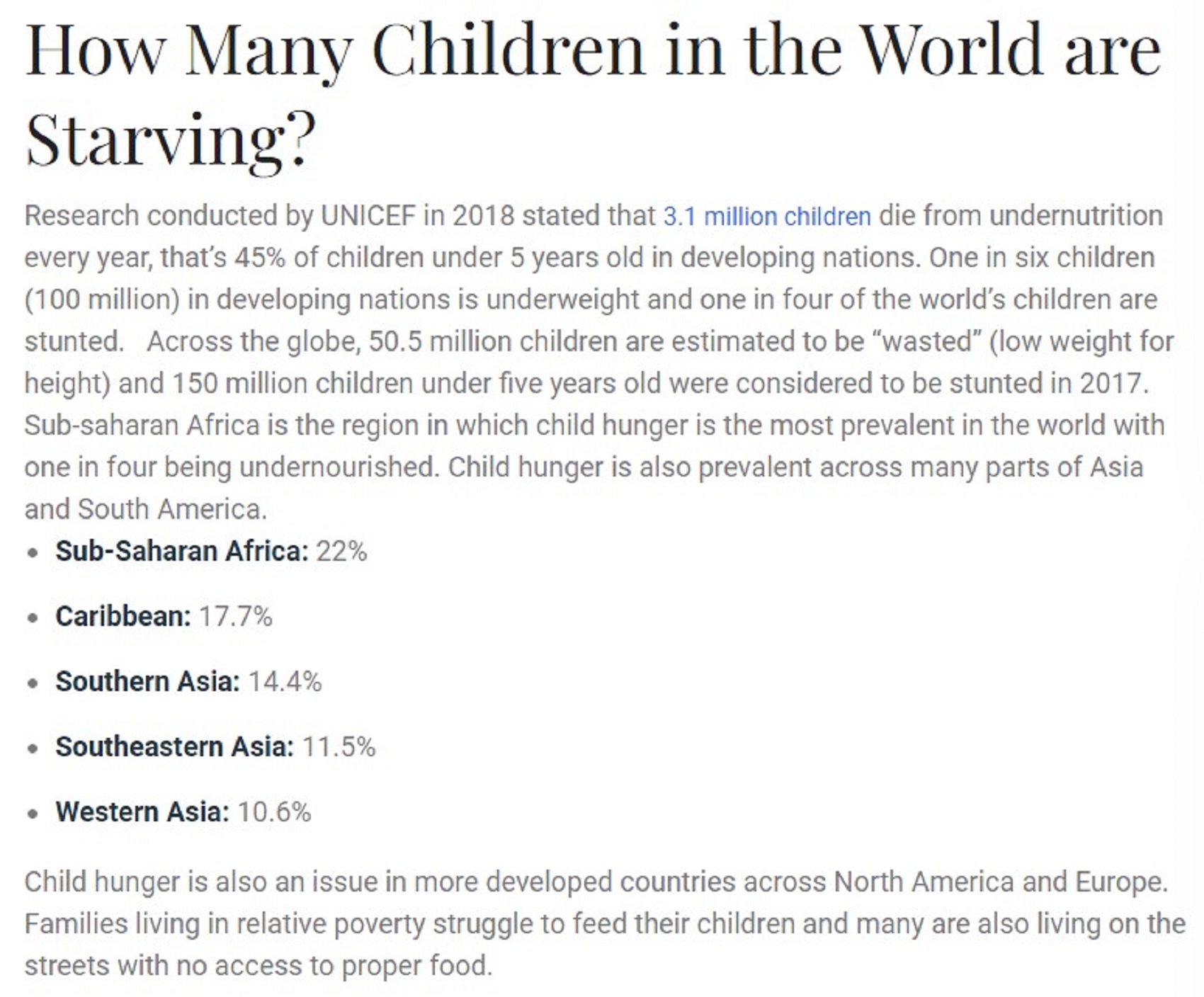
Why is Child Hunger a Problem?
“Each and every child born on this planet has the right to eat. Unfortunately, we live in a world where we have enough food for everyone but not everyone has enough food. The biggest problem with child hunger is the effect hunger has on a developing child. Malnourishment results in early development issues which can cause stunted growth, illness, and issues with disease. Being born into poverty is starting life at a huge disadvantage. When you do not have access to food there are very few opportunities for you as a child to grow, be healthy, be happy, and have the opportunities that more privileged individuals take for granted. Hunger also deprives children of much more than just food. It deprives them of a chance to grow strong enough to take care of themselves, to earn an education, to care for their family, and to enjoy their life. A child without food has a slim chance of truly living their life at all.” ref
What Happens When a Child Faces Hunger?
“When a child is born into this world with little to no access to food there are huge implications for that child. If they are born in sub-Saharan Africa it is likely they will die before they reach the age of five years old. Even with access to food, they may not get adequate amounts of nutrients required to sustain a healthy body. This leads to stunted growth, cognitive and behavioral issues, a lack of energy to perform basic tasks, and the inability to learn to their full capability.” ref
Child Hunger Facts
- “Children who suffer from hunger experience up to 160 days of illness each year (Glicken, M.D., 2010)
- Undernutrition magnifies the effects of diseases including measles, malaria, severe diarrhea, and pneumonia (Black, Morris, & Bryce, 2003; Bryce et al., 2005).
- Vitamin A is one of the most common deficiencies in children in low-middle income countries. This increases their chances of developing and contracting infectious diseases (UNICEF, 2018b).
- Zinc deficiency is the leading cause of diarrhea which is a major cause in the death of children aged five and under (UNICEF, 2018b).
- 40% of children under the age of five in developing countries are anemic and half are iron deficient (UNICEF, 2018b).
- 66 million primary school-aged children go into school hungry in the developing world. 23 million of those children live in Africa (World Food Programme [WFP], 2012).
- In the USA, 25% of children in households at risk of hunger may be forced to rely on hunger relief charities.” ref
How Does Child Hunger Affect Learning?
“Children living in hunger in developing nations have few opportunities to go and learn at school. Even if they have access to a school, without food, their learning and development are limited. Malnutrition affects a child’s growth, it stunts their body, hinders their abilities, and results in both neurological and cognitive behavior issues as they get older. Children who suffer from hunger cannot learn effectively and are at a huge disadvantage. Food powers our brains and our brain allows us to learn and develop. Without proper nutrition, a child’s education and ability to learn is extremely limited.” ref
How Does Food Insecurity Affect Students?
“Food insecurity is not just an issue in developing countries but also in the developed world. In the USA, for example, nearly 50 million people nationwide suffer from food insecurity. These people are most commonly families with children. In April 2016, one in six households in the USA reported the inability to afford food. Food insecurity can negatively impact a child’s education due to:
- Development of behavioral and mental health issues such as anxiety, and depression.
- Poor performance in vital learning subjects like maths and English.
- Increased tardiness at school.
- Drastically reducing a child’s chances of graduation.” ref
Law in Mesopotamia
“Mesopotamians had the first written codified laws which reveal the level of social, political, economical, and legal development of the Mesopotamian civilization. Law in Mesopotamia is frequently closely associated with Code of Hammurabi inscribed on seven-foot and four-inch (2,25 meter) tall stela discovered at Susa but the oldest law codes date from the Sumerian Period. The oldest example of a legal code is attributed to Urukagna who ruled the Sumerian city-state of Lagash in the 24th century BCE or 4,422 years ago, although the actual text has never been discovered.” ref
“The Code of Ur-Nammu created by Ur-Nammu of Ur (21s century BCE) is the oldest known code of law which is only partly preserved. The laws were inscribed on a clay tablet in Sumerian language and arranged in casuistic form, a pattern in which a crime is followed by the punishment which was also the basis of nearly all later codes of law including the Code of Hammurabi. Code of Ur-Nammu is also notable for instituting monetary compensations for inflicting bodily injuries which are considered the oldest known code of law.” ref
“In contrary to Code of Ur-Nammu, the Code of Hammurabi from the 18th century BCE was based on the principle “an eye for an eye, a tooth for a tooth” (lex talionis). One of the most famous ancient codes contains 282 judgments of civil and criminal law. The penalties vary from crime to crime as well as on the social status of the offender although even slaves had some rights.” ref
“Hittite cuneiform tablets from the 14th century BC found at Hattusa also include a number of Hittite laws which foresee less severe penalties than the Babylonian code of laws. Penalties were in some cases were even reduced at least twice. Hittite laws also reveal a tension to more systematical arrangement from the most serious to minor violations. The Hittites did not follow lex talionis.” ref
With rise of Assyria also occurred changes in penal laws which were more severer and more brutal. The death penalty and corporal penalties such as flogging and cutting of ears and noses were very common, while forced labor was the most common punishment for less severe violations. Besides severer penalties, the Assyrian law also reflects the great change of the social position of women. Women in Babylon and Hittite Empire were practically equal to men and were even allowed to divorce, while a man in Assyria was allowed to kill his wife if she committed adultery and to send his wife away without divorce money.” ref
Code of Hammurabi
“The Code of Hammurabi is a Babylonian legal text composed c. 1755–1750 BCE or 3,777-3,772 years ago. It is the longest, best-organised, and best-preserved legal text from the ancient Near East. It is written in the Old Babylonian dialect of Akkadian, purportedly by Hammurabi, sixth king of the First Dynasty of Babylon. The primary copy of the text is inscribed on a basalt or diorite stele 2.25 m (7 ft 4+1⁄2 in) tall. The stele was rediscovered in 1901 at the site of Susa in present-day Iran, where it had been taken as plunder six hundred years after its creation. The text itself was copied and studied by Mesopotamian scribes for over a millennium.” ref
“The top of the stele features an image in relief of Hammurabi with Shamash, the Babylonian sun god, and god of justice. Below the relief are about 4,130 lines of cuneiform text: one fifth contains a prologue and epilogue in poetic style, while the remaining four fifths contain what are generally called the laws. In the prologue, Hammurabi claims to have been granted his rule by the gods “to prevent the strong from oppressing the weak”. The laws are casuistic, expressed as “if … then” conditional sentences. Their scope is broad, including, for example, criminal law, family law, property law, and commercial law.” ref
“Modern scholars responded to the Code with admiration at its perceived fairness and respect for the rule of law, and at the complexity of Old Babylonian society. There was also much discussion of its influence on the Mosaic Law. Scholars quickly identified lex talionis—the “eye for an eye” principle—underlying the two collections. Debate among Assyriologists has since centered around several aspects of the Code: its purpose, its underlying principles, its language, and its relation to earlier and later law collections.” ref
“Hammurabi (or Hammurapi), the sixth king of the Amorite First Dynasty of Babylon, ruled from 1792 to 1750 BCE (middle chronology). He secured Babylonian dominance over the Mesopotamian plain through military prowess, diplomacy, and treachery. When Hammurabi inherited his father Sin-Muballit‘s throne, Babylon held little local sway; the local hegemon was Rim-Sin of Larsa. Hammurabi waited until Rim-Sin grew old, then conquered his territory in one swift campaign, leaving his organization intact. Later, Hammurabi betrayed allies in Eshnunna, Elam, and Mari to gain their territories.” ref
“Hammurabi had an aggressive foreign policy, but his letters suggest he was concerned with the welfare of his many subjects and was interested in law and justice. He commissioned extensive construction works, and in his letters, he frequently presents himself as his people’s shepherd. Justice is also a theme of the prologue to the Code, and “the word translated ‘justice’ [ešērum]… is one whose root runs through both prologue and epilogue”. Although Hammurabi’s Code was the first Mesopotamian law collection to be discovered, it was not the first written; several earlier collections survive. These collections were written in Sumerian and Akkadian. They also purport to have been written by rulers. There were almost certainly more such collections, as statements of other rulers suggest the custom was widespread.” ref
“The similarities between these law collections make it tempting to assume a consistent underlying legal system. As with the Code of Hammurabi, however, it is difficult to interpret the purpose and underlying legal systems of these earlier collections, prompting numerous scholars to question whether this should be attempted. Extant collections include:
- The Code of Ur-Nammu of Ur.
- The Code of Lipit-Ishtar of Isin.
- The Laws of Eshnunna (written by Bilalama or by Dadusha).
- Another collection, which Martha Roth calls the “Laws of X”, but which may simply be the end of the Code of Ur-Nammu.” ref
“There are additionally thousands of documents from the practice of law, from before and during the Old Babylonian period. These documents include contracts, judicial rulings, letters on legal cases, and reform documents such as that of Urukagina, king of Lagash in the mid-3rd millennium BCE, whose reforms combatted corruption. Mesopotamia has the most comprehensive surviving legal corpus from before the Digest of Justinian, even compared to those from ancient Greece and Rome.” ref
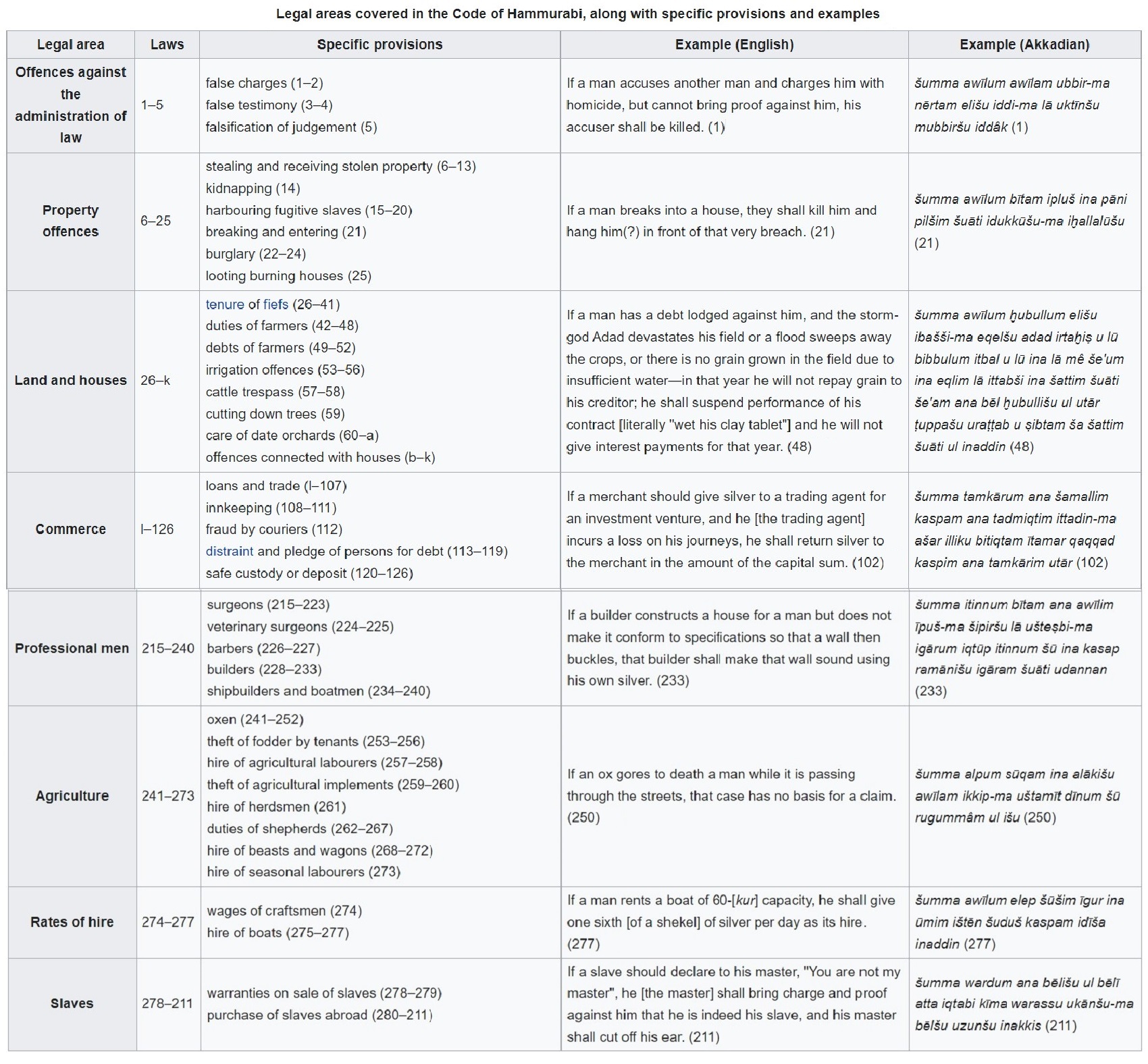
Property offenses: stealing and receiving stolen property, kidnapping, harboring fugitive slaves, breaking and entering, burglary, looting and burning houses. Such as, if a man breaks into a house, they shall kill him and hang him(?) in front of that very breach. ref
Land and houses: tenure of fiefs, duties of farmers, debts of farmers, irrigation offenses, cattle trespass, cutting down trees, care of date orchards, and offenses connected with houses. Such as, if a man has a debt lodged against him, and the storm-god Adad devastates his field or a flood sweeps away the crops, or there is no grain grown in the field due to insufficient water—in that year he will not repay grain to his creditor; he shall suspend performance of his contract [literally “wet his clay tablet”] and he will not give interest payments for that year. ref
Commerce: loans and trade, innkeeping, fraud by couriers, distraint and pledge of persons for debt, and safe custody or deposit. Such as, if a merchant should give silver to a trading agent for an investment venture, and he [the trading agent] incurs a loss on his journeys, he shall return the silver to the merchant in the amount of the capital sum. ref
Professional Men: surgeons, veterinary surgeons, barbers, builders, shipbuilders and boatmen. Such as, if a builder constructs a house for a man but does not make it conform to specifications so that a wall then buckles, that builder shall make that wall sound using his own silver. ref
Agriculture: oxen, theft of fodder by tenants, hire of agricultural laborers, theft of agricultural implements, hire of herdsmen, duties of shepherds, hire of beasts and wagons, and hire of seasonal laborers. ref
Rates of Hire: wages of craftsmen and hire of boats. If a man rents a boat of 60-[kur] capacity, he shall give one-sixth [of a shekel] of silver per day as its hire. ref
Slaves: warranties on the sale of slaves and purchase of slaves abroad. Such as, if a slave should declare to his master, “You are not my master”, he [the master] shall bring charge and proof against him that he is indeed his slave, and his master shall cut off his ear. ref
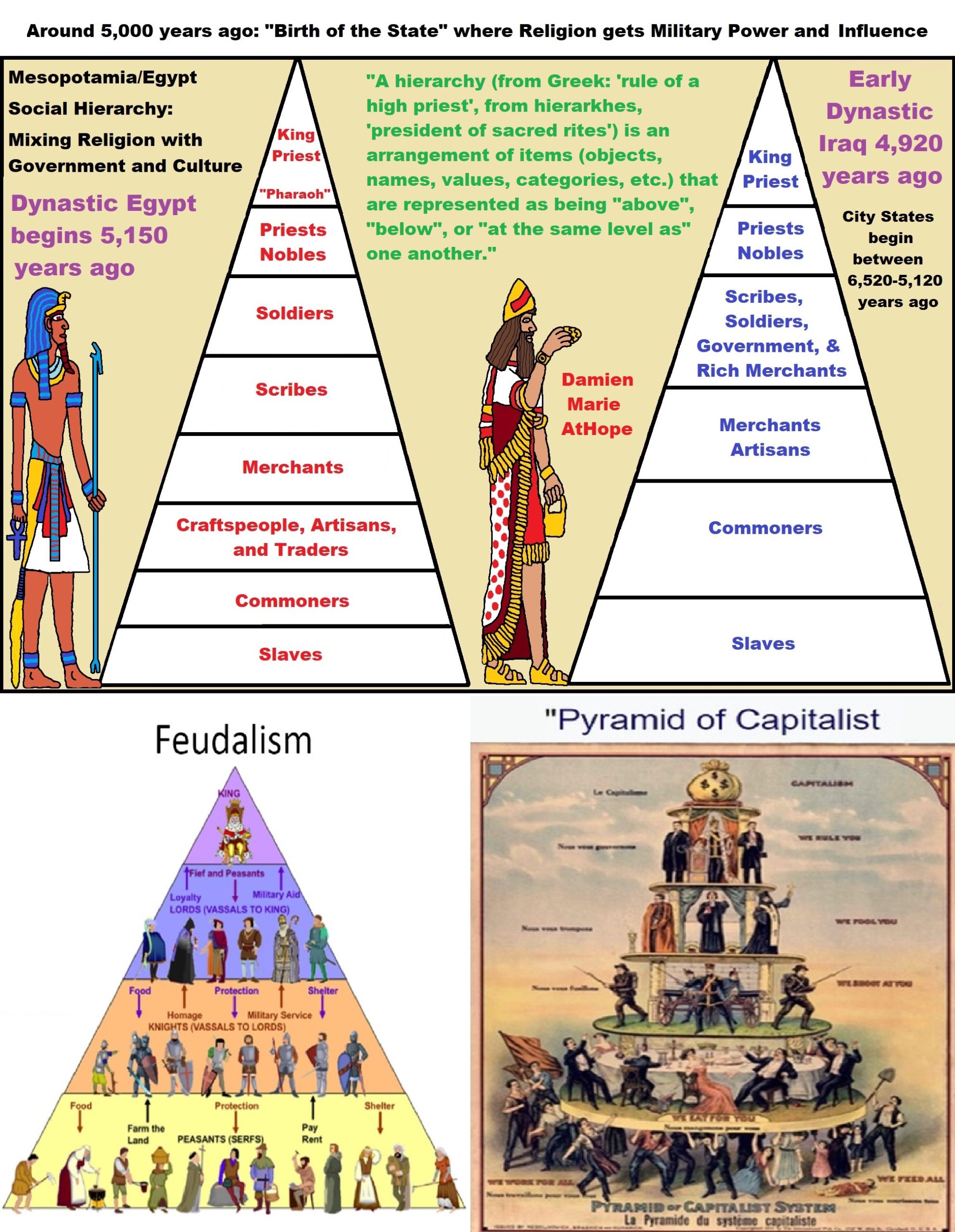
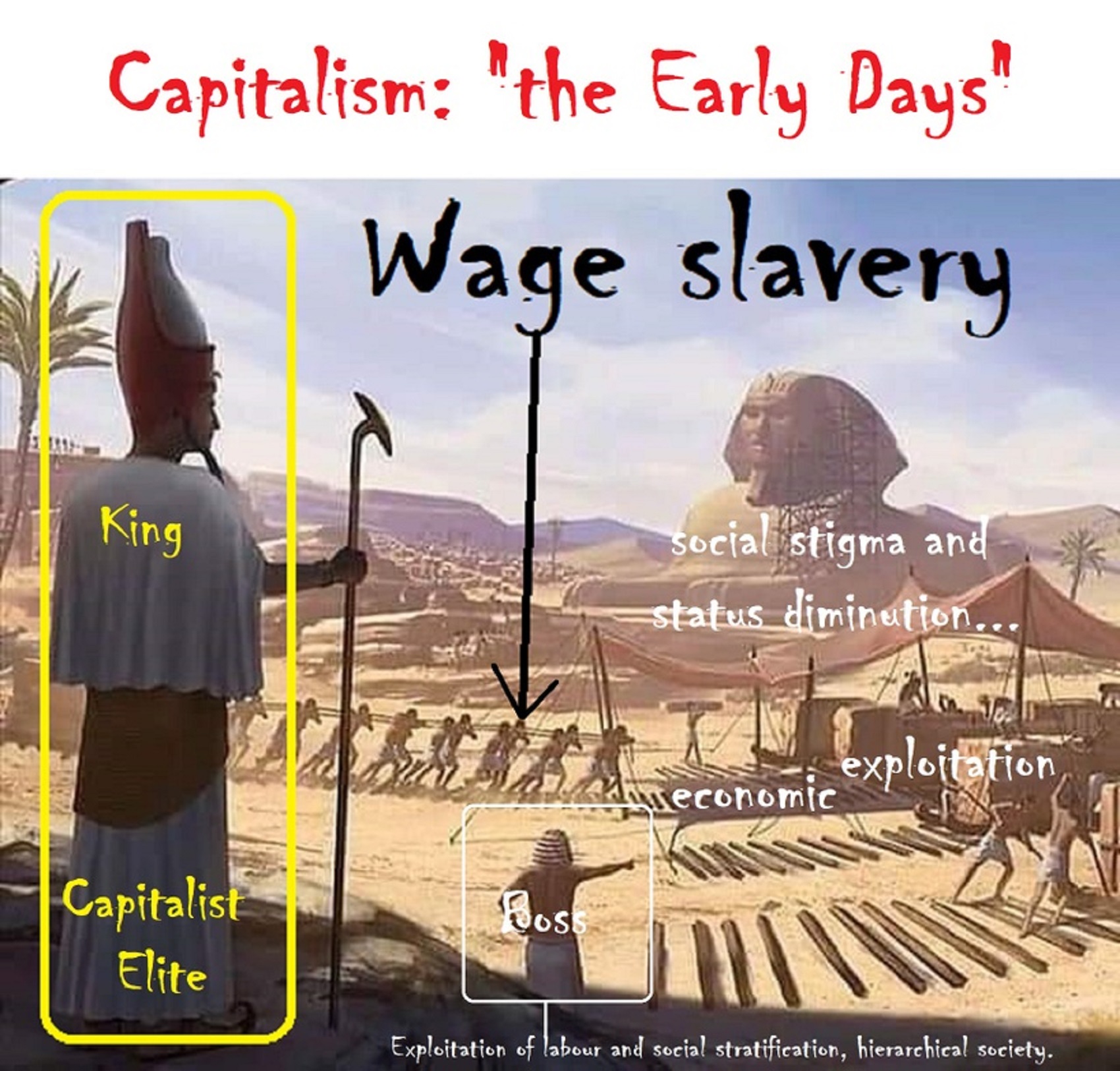
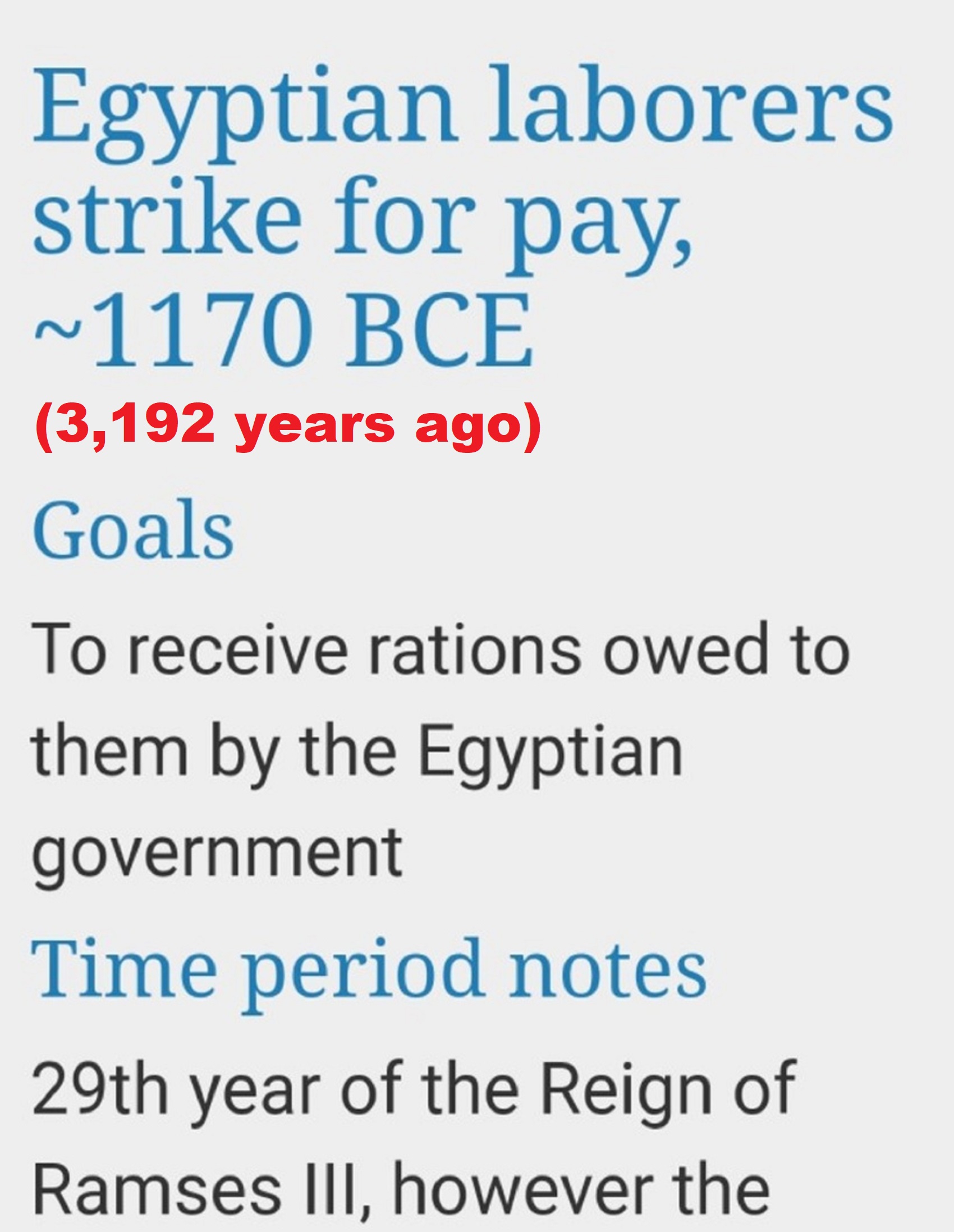
Wage Slavery
“Wage slavery is a term used to describe a situation where a person’s livelihood depends on wages or a salary, especially when the wages are low and the person has few realistic chances of upward mobility.” ref
“The term is sometimes used to criticize exploitation of labor and social stratification, with the former seen primarily as unequal bargaining power between labor and capital (particularly when workers are paid comparatively low wages, e.g. in sweatshops) and the latter as a lack of workers’ self-management, fulfilling job choices and leisure in an economy.” ref
“The criticism of social stratification covers a wider range of employment choices bound by the pressures of a hierarchical society to perform otherwise unfulfilling work that deprives humans of their “species character” not only under threat of starvation or poverty, but also of social stigma and status diminution. Historically, some socialist organizations and activists have espoused workers’ self-management or worker cooperatives as possible alternatives to wage labor.” ref
“Similarities between wage labor and slavery were noted as early as Cicero in Ancient Rome, such as in De Officiis. With the advent of the Industrial Revolution, thinkers such as Pierre-Joseph Proudhon and Karl Marx elaborated the comparison between wage labor and slavery, while Luddites emphasized the dehumanization brought about by machines. The introduction of wage labor in 18th-century Britain was met with resistance, giving rise to the principles of syndicalism and anarchism.” ref
“Before the American Civil War, Southern defenders of African American slavery invoked the concept of wage slavery to favorably compare the condition of their slaves to workers in the North. The United States abolished most forms of slavery after the Civil War, but labor union activists found the metaphor useful – according to historian Lawrence Glickman, in the Gilded Age “[r]eferences abounded in the labor press, and it is hard to find a speech by a labor leader without the phrase.” ref
The First Labor Strike in History?
“THE PROBLEM WAS THREE-FOLD: A LOSS OF LABOR FROM CASUALTIES IN WAR & THE EXPENSE IN REPELLING THE SEA PEOPLES, CORRUPT OFFICIALS, & POOR HARVESTS. OFFICIALS ORDERED PASTRIES DELIVERED TO THE STRIKING WORKERS & HOPED THEY WOULD BE SATISFIED & GO HOME.” ref
“For over 20 years Ramesses III had done his best for the people and, as he approached his 30th year, plans were set in motion for a grand jubilee festival to honor him. Egyptologist Toby Wilkinson notes:
The court now looked forward to the king’s thirty-year jubilee, determined to stage a celebration worthy of so glorious a monarch. There would be no stinting, no corners cut. Only the most lavish ceremonies would do. It was a fateful decision. Beneath the pomp and circumstance, the Egyptian state had been seriously weakened by its exertions. The military losses of 1178 were still keenly felt. Foreign trade with the Near East had never fully recovered from the Sea People‘s orgy of destruction. The temples’ coffers might be full of copper and myrrh, but their supplies of grain – the staple of the Egyptian economy – were gravely depleted. Against such a background, the jubilee preparations would prove a serious drain on resources. (334)” ref
“The troubles began in 1159 BCE, three years before the festival, when the monthly wages of the tomb-builders and artisans at Set-Ma’at (“The Place of Truth”, better known as Deir el-Medina) arrived almost a month late. The scribe Amennakht, who also seems to have served as a kind of shop steward, negotiated with local officials for the distribution of grain to the workers but this was only a temporary solution to an immediate problem; the underlying cause of the failure in payment was never addressed.” ref
“Instead of looking into what had gone wrong and trying to prevent it from happening again, officials dedicated themselves to preparation for the grand festival. The payment to the workers at Deir el-Medina was again late and then again late until, as Wilkinson writes, “the system of paying the necropolis workers broke down altogether, prompting the earliest recorded strikes in history” (335). The workers had waited for 18 days beyond their payday and refused to wait any longer. They lay down their tools and marched toward the city shouting “We are hungry!” They first demonstrated at Ramesses III’s mortuary temple and then staged a sit-in near the temple of Thutmose III.” ref
“The local officials had no idea how to deal with the situation; nothing like this had ever happened in the history of the country. Ma’at applied to everyone, from the king to the peasant, and everyone was expected to recognize his or her place in the scheme of the universe and act accordingly. Workers rising up and demanding their pay was quite simply an impossibility because it violated the principle of ma’at. With no understanding of how to deal with the problem, officials ordered pastries delivered to the striking workers and hoped they would be satisfied and go home.” ref
“The pastries were not enough, however, and the next day the men took over the southern gate of the Ramesseum, the central storehouse of grain in Thebes. Some broke into the inner rooms demanding their pay and the temple officials called the chief of police, a man named Montumes. Montumes told the strikers to leave the temple and return to their work but they refused. Helpless, Montumes withdrew and left the problem for the officials to resolve. The back pay was finally handed over after negotiations between the priest-officials and the strikers but no sooner had the men returned to their village than they discovered their next payment would not be coming.” ref
“Again the workers went on strike, this time taking over and blocking all access to the Valley of the Kings. The significance of this act was that no priests or family members of the deceased were able to enter with food and drink offerings for the dead and this was considered a serious offense to the memory of those who had passed on to the afterlife. When officials appeared with armed guards and threatened to remove the men by force, a striker responded that he would damage the royal tombs before they could move against him and so the two sides were stalemated.” ref
“By this time the men were no longer simply striking over the late payments but what they saw as a serious breach of ma’at. The king was supposed to take care of his people and that meant making sure that officials who oversaw payments did so correctly and in a timely manner. It was now going on three years since the strikes first started and the situation had not changed: the workers would not receive their pay, they would then go on strike, the officials would find the means to pay them, and the same scenario would be repeated again the next month. The tomb-workers and artisans claimed that injustice of the highest order was being perpetrated and they wanted that situation addressed.” ref
“The local government, however, still had no understanding of how to handle the problem. It was their responsibility to maintain order and, especially with the jubilee coming up, keep the peace and uphold the dignity of pharaoh. They could not send official word to the capital that the workers of Thebes refused to do their jobs or they could possibly face execution for failing to do their duty; so they did nothing. In keeping with the traditions of the culture, they should have sent word to the vizier who would then have looked into and corrected the problem. The vizier did, in fact, come to Thebes at about this time in order to collect statues for the jubilee celebration but there is no indication he was told anything about the striking workers.” ref
“The jubilee in 1156 BCE or 3,177 years ago was a great success and, as at all festivals, the participants forgot about their daily troubles with dancing and drink. The problem did not go away, however, and the workers continued their strikes and their struggle for fair payment in the following months. At last some sort of resolution seems to have been reached whereby officials were able to make payments to the workers on time but the dynamic of the relationship between temple officials and workers had changed – as had the practical application of the concept of ma’at – and these would never really revert to their former understandings again. Ma’at was the responsibility of the pharaoh to oversee and maintain, not the workers; and yet the men of Deir el-Medina had taken it upon themselves to correct what they saw as a breach in the policies which helped to maintain essential harmony and balance. The common people had been forced to assume the responsibilities of the king.” ref
Significance
“The strikes of the tomb-workers and artisans were especially influential because these men were among the highest paid and most respected in the country. If they could be treated this poorly, the reasoning went, then others should expect even worse. The influence of the strikes was also so great because these workers had the most to lose, were all very aware of the principle of ma’at and their duty to it, and yet chose to stand up against a governmental practice which they felt was unjust. What began as a complaint over late wages turned into an action protesting corruption and injustice. Toward the end of their strikes the workers were no longer chanting about their hunger but about the larger issue:
We have gone on strike not from hunger but because we have a serious accusation to make: bad things have been done in this place of Pharaoh. (Wilkinson, 337)” ref
“The success of the tomb-worker/artisan strikes inspired others to do the same. Just as the official records of the battle with the Sea Peoples never recorded the Egyptian losses in the land battle, neither do they record any mention of the strikes. The record of the strike comes from a papyrus scroll discovered at Deir el-Medina and most probably written by the scribe Amennakht. The precedent of workers walking away from their jobs was set by these events and, although there are no extant official reports of other similar events, workers now understood they had more power than previously thought. Strikes are mentioned in the latter part of the New Kingdom and Late Period and there is no doubt the practice began with the workers at Deir el-Medina in the time of Ramesses III.” ref


While hallucinogens are associated with shamanism, it is alcohol that is associated with paganism.
The Atheist-Humanist-Leftist Revolutionaries Shows in the prehistory series:
Show two: Pre-animism 300,000 years old and animism 100,000 years old: related to “Anarchism and Socialism”
Show tree: Totemism 50,000 years old: related to “Anarchism and Socialism”
Show four: Shamanism 30,000 years old: related to “Anarchism and Socialism”
Show five: Paganism 12,000 years old: related to “Anarchism and Socialism”
Show six: Emergence of hierarchy, sexism, slavery, and the new male god dominance: Paganism 7,000-5,000 years old: related to “Anarchism and Socialism” (Capitalism) (World War 0) Elite and their slaves!
Prehistory: related to “Anarchism and Socialism” the division of labor, power, rights, and recourses: VIDEO
Pre-animism 300,000 years old and animism 100,000 years old: related to “Anarchism and Socialism”: VIDEO
Totemism 50,000 years old: related to “Anarchism and Socialism”: VIDEO
Shamanism 30,000 years old: related to “Anarchism and Socialism”: VIDEO
Paganism 12,000 years old: related to “Anarchism and Socialism” (Pre-Capitalism): VIDEO
Paganism 7,000-5,000 years old: related to “Anarchism and Socialism” (Capitalism) (World War 0) Elite and their slaves: VIEDO
Paganism 5,000 years old: progressed organized religion and the state: related to “Anarchism and Socialism” (Kings and the Rise of the State): VIEDO
Paganism 4,000 years old: related to “Anarchism and Socialism” (First Moralistic gods, then the Origin time of Monotheism): VIEDO
I do not hate simply because I challenge and expose myths or lies any more than others being thought of as loving simply because of the protection and hiding from challenge their favored myths or lies.
The truth is best championed in the sunlight of challenge.
An archaeologist once said to me “Damien religion and culture are very different”
My response, So are you saying that was always that way, such as would you say Native Americans’ cultures are separate from their religions? And do you think it always was the way you believe?
I had said that religion was a cultural product. That is still how I see it and there are other archaeologists that think close to me as well. Gods too are the myths of cultures that did not understand science or the world around them, seeing magic/supernatural everywhere.
I personally think there is a goddess and not enough evidence to support a male god at Çatalhöyük but if there was both a male and female god and goddess then I know the kind of gods they were like Proto-Indo-European mythology.
This series idea was addressed in, Anarchist Teaching as Free Public Education or Free Education in the Public: VIDEO
Our 12 video series: Organized Oppression: Mesopotamian State Force and the Politics of power (9,000-4,000 years ago), is adapted from: The Complete and Concise History of the Sumerians and Early Bronze Age Mesopotamia (7000-2000 BC): https://www.youtube.com/watch?v=szFjxmY7jQA by “History with Cy“
Show #1: Mesopotamian State Force and the Politics of Power (Samarra, Halaf, Ubaid)
Show #2: Mesopotamian State Force and the Politics of Power (Eridu “Tell Abu Shahrain”)
Show #3: Mesopotamian State Force and the Politics of Power (Uruk and the First Cities)
Show #4: Mesopotamian State Force and the Politics of Power (First Kings)
Show #5: Mesopotamian State Force and the Politics of Power (Early Dynastic Period)
Show #6: Mesopotamian State Force and the Politics of Power (King/Ruler Lugalzagesi)
Show #7: Mesopotamian State Force and the Politics of Power (Sargon and Akkadian Rule)
Show #9: Mesopotamian State Force and the Politics of Power (Gudea of Lagash and Utu-hegal)
Show #12: Mesopotamian State Force and the Politics of Power (Aftermath and Legacy of Sumer)

The “Atheist-Humanist-Leftist Revolutionaries”
Cory Johnston ☭ Ⓐ Atheist Leftist @Skepticallefty & I (Damien Marie AtHope) @AthopeMarie (my YouTube & related blog) are working jointly in atheist, antitheist, antireligionist, antifascist, anarchist, socialist, and humanist endeavors in our videos together, generally, every other Saturday.
Why Does Power Bring Responsibility?
Think, how often is it the powerless that start wars, oppress others, or commit genocide? So, I guess the question is to us all, to ask, how can power not carry responsibility in a humanity concept? I know I see the deep ethical responsibility that if there is power their must be a humanistic responsibility of ethical and empathic stewardship of that power. Will I be brave enough to be kind? Will I possess enough courage to be compassionate? Will my valor reach its height of empathy? I as everyone, earns our justified respect by our actions, that are good, ethical, just, protecting, and kind. Do I have enough self-respect to put my love for humanity’s flushing, over being brought down by some of its bad actors? May we all be the ones doing good actions in the world, to help human flourishing.
I create the world I want to live in, striving for flourishing. Which is not a place but a positive potential involvement and promotion; a life of humanist goal precision. To master oneself, also means mastering positive prosocial behaviors needed for human flourishing. I may have lost a god myth as an atheist, but I am happy to tell you, my friend, it is exactly because of that, leaving the mental terrorizer, god belief, that I truly regained my connected ethical as well as kind humanity.
Cory and I will talk about prehistory and theism, addressing the relevance to atheism, anarchism, and socialism.
At the same time as the rise of the male god, 7,000 years ago, there was also the very time there was the rise of violence, war, and clans to kingdoms, then empires, then states. It is all connected back to 7,000 years ago, and it moved across the world.
Cory Johnston: https://damienmarieathope.com/2021/04/cory-johnston-mind-of-a-skeptical-leftist/?v=32aec8db952d
The Mind of a Skeptical Leftist (YouTube)
Cory Johnston: Mind of a Skeptical Leftist @Skepticallefty
The Mind of a Skeptical Leftist By Cory Johnston: “Promoting critical thinking, social justice, and left-wing politics by covering current events and talking to a variety of people. Cory Johnston has been thoughtfully talking to people and attempting to promote critical thinking, social justice, and left-wing politics.” http://anchor.fm/skepticalleft
Cory needs our support. We rise by helping each other.
Cory Johnston ☭ Ⓐ @Skepticallefty Evidence-based atheist leftist (he/him) Producer, host, and co-host of 4 podcasts @skeptarchy @skpoliticspod and @AthopeMarie
Damien Marie AtHope (“At Hope”) Axiological Atheist, Anti-theist, Anti-religionist, Secular Humanist. Rationalist, Writer, Artist, Poet, Philosopher, Advocate, Activist, Psychology, and Armchair Archaeology/Anthropology/Historian.
Damien is interested in: Freedom, Liberty, Justice, Equality, Ethics, Humanism, Science, Atheism, Antiteism, Antireligionism, Ignosticism, Left-Libertarianism, Anarchism, Socialism, Mutualism, Axiology, Metaphysics, LGBTQI, Philosophy, Advocacy, Activism, Mental Health, Psychology, Archaeology, Social Work, Sexual Rights, Marriage Rights, Woman’s Rights, Gender Rights, Child Rights, Secular Rights, Race Equality, Ageism/Disability Equality, Etc. And a far-leftist, “Anarcho-Humanist.”
With religion, it is like your brain is in a noose, squeezing out any hope of critical thinking about religious beliefs. Leaving the victim faith-drunk as if all the oxygen of their mental freedom is cut off and hope for self-mastery is but some far away fantasy out of reach.
My Thought on the Evolution of Gods?
Animal protector deities from old totems/spirit animal beliefs come first to me, 13,000/12,000 years ago, then women as deities 11,000/10,000 years ago, then male gods around 7,000/8,000 years ago. Moralistic gods around 5,000/4,000 years ago, and monotheistic gods around 4,000/3,000 years ago.

Damien Marie AtHope’s Art
Damien Marie AtHope (Said as “At” “Hope”)/(Autodidact Polymath but not good at math):
Axiological Atheist, Anti-theist, Anti-religionist, Secular Humanist, Rationalist, Writer, Artist, Jeweler, Poet, “autodidact” Philosopher, schooled in Psychology, and “autodidact” Armchair Archaeology/Anthropology/Pre-Historian (Knowledgeable in the range of: 1 million to 5,000/4,000 years ago). I am an anarchist socialist politically. Reasons for or Types of Atheism
My Website, My Blog, & Short-writing or Quotes My YouTube, Twitter: @AthopeMarie, and My Email: damien.marie.athope@gmail.com

